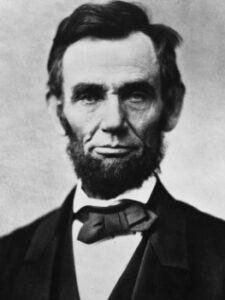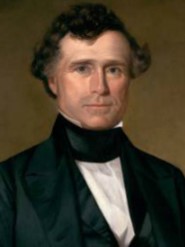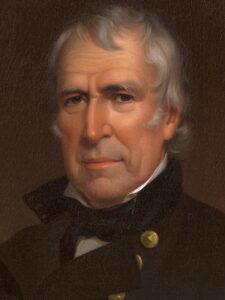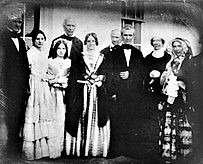Archive for June, 2024
» posted on Sunday, June 30th, 2024 by Linda Lou Burton
#16. Lincoln, Abraham
Linda Lou Burton posting from Little Rock, Arkansas – Abraham Lincoln (February 12, 1809 – April 15, 1865) was the 16th president of the United States from 1861 to 1865. I’m finding it very hard to write about Abraham Lincoln; for one, there’s probably been more written about this president than any; he was neither obscure nor forgettable. So I’m guessing there isn’t much about the man you don’t already know, or have an opinion about. And I’ve already written a lot about “Abe” – on the Journey I came upon his statue everywhere; in front of the capitol in Charleston, West Virginia, a pensive, sad figure that took research to determine if he was sad about the war, or family matters, or just suffering the general melancholia we’ve heard about. In Frankfort, Kentucky his statue stands in the capitol rotunda, with Jefferson Davis nearby. I found that not only odd, but strangely heartwarming – two men on different sides, in a position to communicate across the room. In Springfield, Illinois I got the full package – I visited his tomb, his home, his law office (where his kids romped around while he was 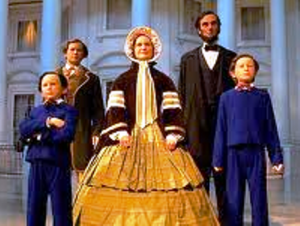 absorbed in his work) and the topper of it all – the Disney version of Lincolnland, with holograph ghosts, cannon fire jolting your seat in the 4D show, and a modern-day telecast of the 1860 election, So I refer you to those posts rather than tell it all again; the links are at the end.
absorbed in his work) and the topper of it all – the Disney version of Lincolnland, with holograph ghosts, cannon fire jolting your seat in the 4D show, and a modern-day telecast of the 1860 election, So I refer you to those posts rather than tell it all again; the links are at the end.
Instead, I’m focusing on four moments in time: his first inauguration, the Emancipation Proclamation, his second inauguration, and his funeral. I grew up in the south; a number of my ancestors served in the Confederate Army and a few in the Union Army; one family had sons serving in both, and two sons hiding in the woods to avoid either. Lincoln’s presidency was a time of heart-rending confusion and upheaval; a time when beliefs and behaviors learned at Daddy’s knee were brought into question. Not just actions were forced to change, but feelings about those actions. It was emotional. That’s the can of worms that came with Lincoln’s job.
1861: First Inauguration
 Lincoln won 180 electoral votes on November 6, 1860. Seven deep-south states declared their secession from the Union and formed the Confederate States of America before he arrived in Washington for his inauguration. Word of an assassination conspiracy brought him into the city through Baltimore at midnight on a special train. The air was thick with rumors of “rebel plots” to assassinate or capture Lincoln before he took office. General Winfield Scott was charged with providing protection for Lincoln; he too received death threats. On the procession to the Capitol, Lincoln’s carriage was so closely surrounded by marshals and cavalry it was almost hidden from view.
Lincoln won 180 electoral votes on November 6, 1860. Seven deep-south states declared their secession from the Union and formed the Confederate States of America before he arrived in Washington for his inauguration. Word of an assassination conspiracy brought him into the city through Baltimore at midnight on a special train. The air was thick with rumors of “rebel plots” to assassinate or capture Lincoln before he took office. General Winfield Scott was charged with providing protection for Lincoln; he too received death threats. On the procession to the Capitol, Lincoln’s carriage was so closely surrounded by marshals and cavalry it was almost hidden from view.
Nevertheless, on March 4, 1861, Abraham Lincoln stood on the East Portico before a crowd of 25,000 and delivered his first address to a nation in trouble. Indicating that he’d leave aside matters of no special anxiety, he made these points:
- Slavery: “I have no purpose, directly or indirectly, to interfere with the institution of slavery in the States where it exists. I believe I have no lawful right to do so, and I have no inclination to do so.”
- Legal status of the South: “I have just taken an oath to preserve, protect, and defend the United States Constitution, which enjoins me to see that the laws of the Union are faithfully executed in all states, even those that have seceded.”
- Use of force: “There will be no use of force against the South, unless it proves necessary to hold, occupy, and possess the property and places belonging to the federal government. If the South choses to actively take up arms against the Government, their insurrection will meet a firm and forceful response.”
Lincoln concluded his speech with a plea for calm and cool deliberation in the face of mounting tension throughout the nation. He assured the rebellious states that the Federal government would never initiate any conflict with them. Though most of the northern press praised the speech, it was met with contempt in the south.
1862: Emancipation Proclamation
The Federal government’s power to end slavery was limited by the Constitution. In June 1862, Congress passed an act banning slavery on all federal territory, which Lincoln signed. Privately, Lincoln concluded that the Confederacy’s slave base had to be eliminated. Publicly he said this:
My paramount object in this struggle is to save the Union, and is not either to save or to destroy slavery. If I could save the Union without freeing any slave I would do it, and if I could save it by freeing all the slaves I would do it; and if I could save it by freeing some and leaving others alone I would also do that. What I do about slavery, and the colored race, I do because I believe it helps to save the Union; and what I forbear, I forbear because I do not believe it would help to save the Union … I have here stated my purpose according to my view of official duty; and I intend no modification of my oft-expressed personal wish that all men everywhere could be free.
The Emancipation Proclamation became effective January 1, 1863 and affirmed the freedom of slaves in the ten states not then under Union control. With the abolition of slavery now a military objective, Union armies advancing south liberated three million slaves; enlisting former slaves became official policy. In a letter to Andrew Johnson, then military governor of Tennessee, Lincoln encouraged him to lead the way in raising black troops, stating: “The bare sight of 50,000 armed and drilled black soldiers on the banks of the Mississippi would end the rebellion at once.”
1865: Second Inauguration
The Republicans nominated Abraham Lincoln again in 1864, selecting Andrew Johnson as his running mate. Lincoln ran under the label of the new Union Party, to include War Democrats as well as Republicans. Lincoln pledged in writing that if he lost the election, he would still defeat the Confederacy before leaving the White House. His pledge was put into a sealed envelope; which he asked his cabinet members to sign. The pledge:
“This morning, as for some days past, it seems exceedingly probable that this Administration will not be re-elected. Then it will be my duty to so co-operate with the President elect, as to save the Union between the election and the inauguration; as he will have secured his election on such ground that he cannot possibly save it afterward.”
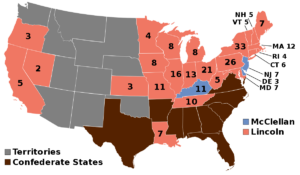 Sherman captured Atlanta in September. On November 8, the Lincoln/Johnson ticket won all but three states – Kentucky, Delaware, and New Jersey. Only twenty-five states participated in the election; of the seceded states Tennessee and Louisiana chose electors who voted for Lincoln; their votes were rejected by Congress. Three new states participated for the first time: Kansas, West Virginia, and Nevada. Of the 40,247 army votes cast, Lincoln received 76%.
Sherman captured Atlanta in September. On November 8, the Lincoln/Johnson ticket won all but three states – Kentucky, Delaware, and New Jersey. Only twenty-five states participated in the election; of the seceded states Tennessee and Louisiana chose electors who voted for Lincoln; their votes were rejected by Congress. Three new states participated for the first time: Kansas, West Virginia, and Nevada. Of the 40,247 army votes cast, Lincoln received 76%.
On March 4, 1865, Lincoln delivered his second inaugural address. In it, he deemed the war casualties to be God’s will.
“Fondly do we hope—fervently do we pray—that this mighty scourge of war may speedily pass away. Yet, if God wills that it continue, until all the wealth piled by the bond-man’s 250 years of unrequited toil shall be sunk, and until every drop of blood drawn with the lash, shall be paid by another drawn with the sword, as was said 3,000 years ago, so still it must be said, “the judgments of the Lord, are true and righteous altogether”. With malice toward none; with charity for all; with firmness in the right, as God gives us to see the right, let us strive on to finish the work we are in; to bind up the nation’s wounds; to care for him who shall have borne the battle, and for his widow, and his orphan—to do all which may achieve and cherish a just and lasting peace, among ourselves, and with all nations.”
Before Lincoln was sworn in, Vice President-elect Andrew Johnson took his oath of office in the Senate Chamber. Obviously inebriated, he later explained that he had been drinking to offset the pain of typhoid fever, but the press ridiculed him as a “drunken clown.” This was the first inauguration to be extensively photographed; one photo is thought to show John Wilkes Booth, a well-known actor and Confederate spy.
1865 Timeline: Assassination and Burial
- On April 9 General Robert E Lee surrendered his Confederate troops to Ulysses S Grant, marking the beginning of the end of the Civil War.
- On April 11 Abraham Lincoln gave a speech in which he promoted voting rights for blacks. John Wilkes Booth was there.
- On the afternoon of April 14 Lincoln and Johnson met for the first time since the inauguration. John Wilkes Booth dropped by Kirkwood house that day and left his card with Johnson’s personal secretary with the message “Don’t wish to disturb you, are you home?”
- On evening of April 14, Abraham and Mary Lincoln attended a play at Ford Theater. Our American Cousin was a comedy, a farce about an awkward, boorish-but-honest American, heading off to England to claim the family estate. John Wilkes Booth was there. He was familiar with the play, and waited for the line that he knew would draw loud laughter; when the character of Asa Trenchard says to Mrs Mountchessington: “Don’t know the manners of good society, eh? Well, I guess I know enough to turn you inside out, old gal – you sockdologizing old man-trap!” At that moment John Wilkes Booth entered the Lincoln box and shot Abraham Lincoln in the back of the head, then leapt onto the stage and escaped through the back to a horse he had left waiting in the alley. Lincoln was first attended by doctors there, then taken across the street to Petersen House. He remained in a coma for eight hours.
- On April 15 at 7:22 AM Lincoln died. His flag-enfolded body was escorted in the rain to the White House by bareheaded Union officers as the city’s church bells tolled. Andrew Johnson was sworn in between 10 and 11 in the presence of most of the Cabinet. Between April 15-19 Lincoln’s body lay in state in the East Room of the White House.
- On April 19 the coffin, attended by large crowds, was transported in a procession down Pennsylvania Avenue to the Capitol Rotunda, where a ceremonial burial service was held. The body again lay in state on the 20th and on the early morning of the following day a prayer service was held for the Lincoln cabinet officials.
- On April 21 Lincoln’s coffin was removed to the depot and placed on a train, which traveled through 444 communities and seven states before arriving in Springfield, Illinois, for internment on May 4.
- On April 26, John Wilkes Booth was caught and killed.
I’d like to talk more about Mary Todd Lincoln, and the Lincoln boys. Back in the happier days of “life in Springfield” when the boys were small, and romping around the little town, I would have invited the whole family over for dinner; a picnic maybe.
But then, everything got so sad.
For Lighter Reading
The Citizen Key, Charleston, West Virginia https://capitalcitiesusa.org/?p=8362#
An April Afternoon, Frankfort, Kentucky https://capitalcitiesusa.org/?p=9950#
Honestly Abe, Springfield, Illinois https://capitalcitiesusa.org/?p=9141#
» posted on Saturday, June 29th, 2024 by Linda Lou Burton
#15. Buchanan, James Jr
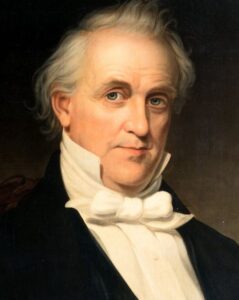 Linda Lou Burton posting from Little Rock, Arkansas – James Buchanan Jr (April 23, 1791 – June 1, 1868) was the 15th president of the United States, from 1857 to 1861. We’ve gone from rough and ready to dull to pretty boy in descriptions of the last few presidents. The words obscure and forgettable also popped up. James Buchanan is the first one that has been accused of treason by a biographer. Jean Baker wrote in 2004: “Buchanan’s failing during the crisis over the Union was not inactivity, but rather his partiality for the South, a favoritism that bordered on disloyalty in an officer pledged to defend all the United States.…. In his betrayal of the national trust, Buchanan came closer to committing treason than any other president in American history.” OK, she actually said he “came close.” It’s kind of like that other thing they say about James, with winks and innuendo. I mean, the man never married, so….did he “come close” to being gay? James’ romantic life got almost as much coverage as his politics, so let’s just tackle the gossip right away. A truth: he never married. A truth: he was engaged to Anne Coleman in 1819. A truth: she broke off the engagement, and suddenly died. A truth: Her father refused permission for James to attend her funeral.
Linda Lou Burton posting from Little Rock, Arkansas – James Buchanan Jr (April 23, 1791 – June 1, 1868) was the 15th president of the United States, from 1857 to 1861. We’ve gone from rough and ready to dull to pretty boy in descriptions of the last few presidents. The words obscure and forgettable also popped up. James Buchanan is the first one that has been accused of treason by a biographer. Jean Baker wrote in 2004: “Buchanan’s failing during the crisis over the Union was not inactivity, but rather his partiality for the South, a favoritism that bordered on disloyalty in an officer pledged to defend all the United States.…. In his betrayal of the national trust, Buchanan came closer to committing treason than any other president in American history.” OK, she actually said he “came close.” It’s kind of like that other thing they say about James, with winks and innuendo. I mean, the man never married, so….did he “come close” to being gay? James’ romantic life got almost as much coverage as his politics, so let’s just tackle the gossip right away. A truth: he never married. A truth: he was engaged to Anne Coleman in 1819. A truth: she broke off the engagement, and suddenly died. A truth: Her father refused permission for James to attend her funeral.
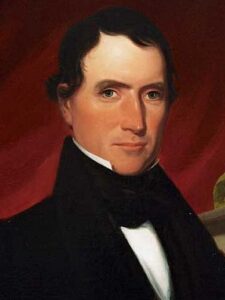 There was much more speculation, aka gossip, about William King than Anne, however. William was from Alabama; he was Franklin Pierce’s vice-president for a while, and he and James lived in the same Washington boarding house, and attended social functions together, for ten years. William King had a few nicknames – Andrew Jackson called him “Miss Nancy,” and others referred to him as James Buchanan’s “better half.” Would I invite James to my party? Yes I would. He grew up in Lancaster, Pennsylvania, where the Amish cooking is to die for; I’d ask him to bring Shoofly Pie and we could talk about what it was like in those frantic days before our country split apart. I’d invite Harriet too, she was in the thick of it.
There was much more speculation, aka gossip, about William King than Anne, however. William was from Alabama; he was Franklin Pierce’s vice-president for a while, and he and James lived in the same Washington boarding house, and attended social functions together, for ten years. William King had a few nicknames – Andrew Jackson called him “Miss Nancy,” and others referred to him as James Buchanan’s “better half.” Would I invite James to my party? Yes I would. He grew up in Lancaster, Pennsylvania, where the Amish cooking is to die for; I’d ask him to bring Shoofly Pie and we could talk about what it was like in those frantic days before our country split apart. I’d invite Harriet too, she was in the thick of it.
Violet Eyes and Golden Hair
 Harriet Rebecca Lane (May 9, 1830 – July 3, 1903) was James’ niece. When she was orphaned at 11 James became her guardian; he sent her to boarding schools, and later, as Secretary of State, he introduced her around Washington circles. She joined him in London in 1854 when he was Minister to the court of St James. Harriet was a beauty, described as having “violet eyes and masses of golden hair;” Queen Victoria was impressed with her; admiring suitors lined up; she even received a proposal of marriage. She was the obvious choice to serve as First Lady for the new Bachelor President in 1857 and was welcomed into the White House with loving admiration. Harriett turned out to be the “Jackie Kennedy” of the 1800s; women copied her hair and clothing styles, and parents named their daughters for her. She wasn’t just a “pretty girl,” she used her position to promote social causes, such as improving the living conditions of Native Americans on reservations. She invited artists and musicians to the White House; and she paid careful attention to seating arrangements at the weekly formal dinner parties, keeping political foes apart, a task which eventually became impossible, as seven states had seceded by the end of James’ presidency.
Harriet Rebecca Lane (May 9, 1830 – July 3, 1903) was James’ niece. When she was orphaned at 11 James became her guardian; he sent her to boarding schools, and later, as Secretary of State, he introduced her around Washington circles. She joined him in London in 1854 when he was Minister to the court of St James. Harriet was a beauty, described as having “violet eyes and masses of golden hair;” Queen Victoria was impressed with her; admiring suitors lined up; she even received a proposal of marriage. She was the obvious choice to serve as First Lady for the new Bachelor President in 1857 and was welcomed into the White House with loving admiration. Harriett turned out to be the “Jackie Kennedy” of the 1800s; women copied her hair and clothing styles, and parents named their daughters for her. She wasn’t just a “pretty girl,” she used her position to promote social causes, such as improving the living conditions of Native Americans on reservations. She invited artists and musicians to the White House; and she paid careful attention to seating arrangements at the weekly formal dinner parties, keeping political foes apart, a task which eventually became impossible, as seven states had seceded by the end of James’ presidency.
Yes, that began under James’ watch. What happened between a peaceful Pennsylvania childhood and the splitting apart of a nation that had fought so hard to became “united” states?
Back Home In Pennsylvania
A log cabin in Cove Gap, Pennsylvania was where James entered the world on April 23, 1791. Scotch-Irish parents James Sr and Elizabeth Buchanan moved into the town of Mercersburg by the time James was three and James Sr became wealthy; he was a merchant, farmer, and real estate investor. James attended Old Stone Academy and then Dickinson College, graduating with honors in 1809. He moved to Lancaster, which was the state capital at the time, read law, and was admitted to the Pennsylvania bar in 1812. He did very well, handling various types of cases, including a much-publicized impeachment trial, and his income grew rapidly. He was elected to the Pennsylvania House of Representatives in 1814, but when the British invaded Maryland that year he served in the defense of Baltimore as a private in the Pennsylvania Militia. James is the only president with military experience who was not an officer; he was also the last president who served in the War of 1812.
Government Positions
- Member of Pennsylvania House of Representatives, 1815-16
- Member of US House of Representatives, 1821-31
- Minister to Russia, (under Jackson) 1832-34
- United States Senator, 1834-45
- Secretary of State, (under Polk) 1845-49
- Minister to England, (under Pierce) 1853-56
- 15th President of the United States, 1857-1861
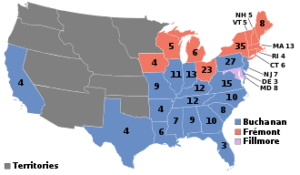 James Buchanan was a regular contender for the Democratic party’s presidential nomination as far back as 1844. He was finally nominated at the Convention in 1856; the Democrats didn’t want Franklin Pierce back again. James proved to be the right choice for the Democrats; he received 174 electoral votes and was inaugurated on March 4, 1857. In his inaugural address, he expressed an abhorrence for the growing divisions over slavery and its status in the territories, while saying that “Congress should play no role in determining the status of slavery in the states or territories.”
James Buchanan was a regular contender for the Democratic party’s presidential nomination as far back as 1844. He was finally nominated at the Convention in 1856; the Democrats didn’t want Franklin Pierce back again. James proved to be the right choice for the Democrats; he received 174 electoral votes and was inaugurated on March 4, 1857. In his inaugural address, he expressed an abhorrence for the growing divisions over slavery and its status in the territories, while saying that “Congress should play no role in determining the status of slavery in the states or territories.”
I’ll go straight to the 1860 Democratic National Convention; Douglas, not Buchanan, was eventually nominated, after much contention. The Party splintered; Republican Abraham Lincoln had enough support from the north for an electoral majority. The army’s Commanding General, Winfield Scott, had warned Buchanan that Lincoln’s election would likely cause at least seven states to secede from the union, and recommended that massive amounts of federal troops and artillery be deployed to those states to protect federal property. That recommendation was ignored.
With Lincoln’s victory, talk of secession and disunion reached a boiling point. In his final speech to Congress, James Buchanan denied the right of states to secede but maintained the federal government was without power to prevent them. The north criticized him for his refusal to stop secession; the south for denying its right to secede. On December 20, South Carolina was the first to leave the Union.
- South Carolina – 12/20/1860
- Mississippi – 1/9/1861
- Florida – 1/10/1861
- Alabama – 1/11/1861
- Georgia 1/19/1861
- Louisiana – 1/26/1861
- Texas – 2/1/1861
At 4:30 a.m. on April 12, 1861, 39 days after Abraham Lincoln was sworn into office, Confederate troops fired on Fort Sumter in South Carolina’s Charleston Harbor. The Civil War began.
The war against James Buchanan began too. He received threatening letters daily, and stores displayed his likeness with a noose drawn around his neck and the word “TRAITOR” written across his forehead. The Senate proposed a resolution of condemnation which ultimately failed. Newspapers accused him of colluding with the Confederacy. His former cabinet members refused to defend him publicly. James became distraught by the attacks and fell sick and depressed. His memoir Mr. Buchanan’s Administration on the Eve of Rebellion, was published in 1866. He died at home of respiratory failure on June 1, 1868 at the age of 77, and is buried in Lancaster.
By then, over 600,000 people had been killed in “brother against brother” Civil War battles, and a president was assassinated. Seems to me the critics put that “traitor” sign on the wrong foreheads.
» posted on Friday, June 28th, 2024 by Linda Lou Burton
#14. Pierce, Franklin
Linda Lou Burton posting from Little Rock, Arkansas –Franklin Pierce (November 23, 1804 – October 8, 1869) was the 14th president of the United States, from 1853 to 1857. Franklin was handsome; just look at all his portraits and see for yourself. History books record him as a drunk; he died of cirrhosis of the liver. Historians rank him as one of the worst and least memorable of all presidents. And as for his wife, well, her story is grim. How deep do we need to go to find something positive to say about Franklin besides the fact that he was good-looking? Go way, way back. Franklin was “born in a log cabin in New Hampshire“ and that happened in November, so the world he entered was COLD. His older brothers and his father were military men – Revolutionary War and War of 1812 uniforms and swords and guns all over the house. And his mother kept having babies that needed tending to. Franklin was a middle kid. And we know what middle kids do, don’t we? They usually resort to tomfoolery to get a little attention. Maybe that explains some of the choices he made in later life. Would I invite this man to my party? I’m on the fence about that. I wouldn’t want a drunk at my party, but geez, after the tragedy that happened to his family between election day and inauguration day, I would have taken a covered dish AND a bottle of whiskey over to his house. But I’m getting ahead of the story. What about that tomfoolery?
Benjamin Pierce made sure his sons were educated. When Franklin was twelve, he was sent to the town school some miles away. Franklin didn’t like school, so one Sunday afternoon he just walked back home. His father fed him, put him in the carriage, and drove him part way back before kicking him out. In a thunderstorm! By the time Franklin entered Phillips Exeter Academy to prepare for college, his school reputation was well established. He was charming, but “prone to misbehavior.”
And Then What Happened
College days brought some interesting friends; one was Nathaniel Hawthorne, who became a lifelong friend. Franklin was “last in his class” after two years; when he graduated in 1824 he’d moved up to fifth in a class of fourteen. Franklin had joined the Athenian Literary Society as a freshman; he organized an unofficial militia company during his junior year, the Bowdoin Cadets. Some tomfoolery there, like leading a strike against the school’s president over an argument about where they could drill. He went on to study law, and was admitted to the New Hampshire bar in 1827 and began to practice; he lost his first case. He did well as a lawyer however, because – he was charming. He had a deep voice. He had a good memory for names and faces. And he got elected to a few things.
Government Positions
- Served in New Hampshire Legislature, 1829-33
- Member of US House of Representatives, 1833-37
- United States Senate, 1837-42
- 14th President of the United States, 1853-1857
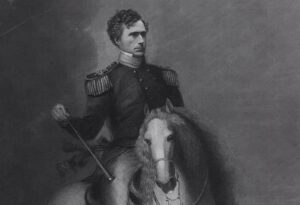 But we can’t forget the military influence he grew up with. He wanted to fight in a war. He wanted to wear a uniform, like his brothers, and his father. He was a passionate advocate for volunteer militias and had experience mustering and drilling bodies of troops. When Congress declared war against Mexico in May 1846, he immediately volunteered. Before you could say Battle of Contreras, Franklin found himself at the port of Vera Cruz as a Brigadier General preparing a march of 2,500 men to take supplies to General Winfield Scott. Charm is only good for so much during a battle. Desire to be viewed as doing something great can push you on however. First day of battle, Franklin’s horse tripped and fell into a crevice, pinning him underneath and injuring his knee. Because it appeared he had fainted, one of his men called for a replacement, calling him a “damned coward.” Next day Franklin was back, hobbling behind his men with a lame knee. As the Battle of Churubusco approached, General Scott ordered Franklin to convalesce. Franklin begged to be allowed to “lead my brigade,” so entered the fight tied to his saddle, and passed out on the field. The Americans won and Franklin wound up getting to negotiate the armistice. The Battle of Mexico City again found Franklin ill; diarrhea kept him in the sick tent. Nevertheless, he remained in command during the three-month occupation of the city and came home to a hero’s welcome. He resigned from the Army in December 1847 as a popular guy. But Jane wasn’t happy.
But we can’t forget the military influence he grew up with. He wanted to fight in a war. He wanted to wear a uniform, like his brothers, and his father. He was a passionate advocate for volunteer militias and had experience mustering and drilling bodies of troops. When Congress declared war against Mexico in May 1846, he immediately volunteered. Before you could say Battle of Contreras, Franklin found himself at the port of Vera Cruz as a Brigadier General preparing a march of 2,500 men to take supplies to General Winfield Scott. Charm is only good for so much during a battle. Desire to be viewed as doing something great can push you on however. First day of battle, Franklin’s horse tripped and fell into a crevice, pinning him underneath and injuring his knee. Because it appeared he had fainted, one of his men called for a replacement, calling him a “damned coward.” Next day Franklin was back, hobbling behind his men with a lame knee. As the Battle of Churubusco approached, General Scott ordered Franklin to convalesce. Franklin begged to be allowed to “lead my brigade,” so entered the fight tied to his saddle, and passed out on the field. The Americans won and Franklin wound up getting to negotiate the armistice. The Battle of Mexico City again found Franklin ill; diarrhea kept him in the sick tent. Nevertheless, he remained in command during the three-month occupation of the city and came home to a hero’s welcome. He resigned from the Army in December 1847 as a popular guy. But Jane wasn’t happy.
Jane
Jane Means Appleton (1806-1863) was petite, frail, and shy, the third of six children born to Elizabeth and the Reverend Jesse Appleton. After her father died, Jane was sent to live with her wealthy grandparents in Amherst, New Hampshire. She was prone to deep depression; and it isn’t known how she met Franklin. What is known is that they married November 19, 1834 – he was 30, she was 28 – and that her grandparents opposed the union due to Franklin’s political ambitions. Jane didn’t like the political life either; she hated living in Washington. She blamed politics for all the troubles in her life.
Franklin and Jane had three sons. Their first, Franklin Jr, died three days after his birth in 1836, while Franklin was a member of the US House of Representatives. Their second, Franklin Robert, was born in 1839 and their third son Benjamin in 1841, when Franklin was a US Senator. Jane was so unhappy in Washington she encouraged Franklin to resign his Senate seat and return to New Hampshire, which he did in 1842. Little Franklin Robert died the next year in New Hampshire at age four, from epidemic typhus.
Was it patriotism, or a need to just shoot something – anything – that sent Franklin off to fight in the Mexican-American War in 1846? Back home as a hero in 1847, his political callings were stirred again. Next thing you know, Franklin Pierce was on the ticket for the 1852 election, opposing General Winfield Scott. Jane fainted when she heard the news.
Bring Out The Tissues
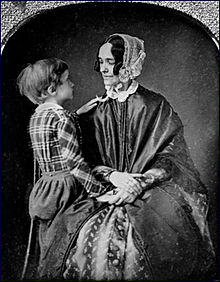 Little Benjamin, Benny as he was called and 11 years old at the time, knew exactly how his mother felt about Washington DC. He wrote a letter to her after Franklin’s nomination saying, “I hope he won’t be elected for I should not like to be at Washington and I know you would not either.”
Little Benjamin, Benny as he was called and 11 years old at the time, knew exactly how his mother felt about Washington DC. He wrote a letter to her after Franklin’s nomination saying, “I hope he won’t be elected for I should not like to be at Washington and I know you would not either.”
Jane prayed Franklin would lose the election, but he pushed the idea that being a president’s son would be an asset to Benny in the future. When the Pierce/King ticket tallied up 254 electoral votes to Scott’s 42, Jane reluctantly made plans to move.
In January 1853 the Pierce family took a train trip to Boston to attend a family friend’s funeral. During their return, a coupler failed and threw several cars down a snowy embankment. Little Benny’s head was crushed and partly severed right before his parent’s eyes. He was the only fatality in the accident.
Franklin and Jane suffered severe depression afterward. When Franklin departed New Hampshire for his inauguration, Jane remained behind. Franklin affirmed his oath of office on a law book rather than a Bible that March 4, and delivered his inaugural address from memory. Regarding his personal tragedy, he said to the crowd, “You have summoned me in my weakness, you must sustain me by your strength.”
Jane wondered if the train accident was divine punishment for her husband’s pursuit and acceptance of high office. She wrote a lengthy letter of apology to Benny for her failings as a mother. She avoided social functions for her first two years as First Lady, making her public debut in that role to great sympathy at the annual public reception held at the White House on New Year’s Day, 1855.
Franklin was not nominated for a second term and left office on March 4, 1857.
After Washington
Seeking warmer weather, the Pierces spent the next three years traveling, beginning with a stay in Madeira and followed by tours of Europe and the Bahamas. Jane died of tuberculosis in December 1863; she was buried at Old North Cemetery in Concord, New Hampshire. Franklin was further grieved by the death of his close friend Nathaniel Hawthorne in May 1864; he was with Hawthorne when the author died unexpectedly. Hawthorne had controversially dedicated his final book to Franklin. Some Democrats tried again to put Franklin’s name up for consideration as the 1864 presidential election unfolded, but he kept his distance; Lincoln easily won a second term.
Though Franklin’s drinking impaired his health, he grew increasingly spiritual. He used his influence to improve the treatment of Jefferson Davis, by then a prisoner at Fort Monroe in Virginia. He offered financial help to Hawthorne’s son Julian, as well as to his own nephews. On the second anniversary of Jane’s death, he was baptized into her Episcopal faith at St. Paul’s Church in Concord. He took up the life of a farmer, farming the land himself and drinking less. In mid-1869, suffering from severe cirrhosis of the liver, he hired a caretaker. No family members were present when he died October 28, at the age of 64.
Maybe he was forgettable as a president. I suspect it was a time he didn’t want to remember either.
» posted on Thursday, June 27th, 2024 by Linda Lou Burton
#13. Fillmore, Millard
 Linda Lou Burton posting from Little Rock, Arkansas –Millard Fillmore (January 7, 1800 – March 8, 1874) was the 13th president of the United States, from 1850 to 1853. I’m going to say right up front that I would invite Millard Fillmore to my party, and if you wouldn’t, then you’re a snob. Like all the folks who’ve picked on this man: His name is dull. He is dull. Historians rate his presidency as “obscure.” This guy needs a Plus-Minus chart, and I’m going to make one for him. Read on, and take notes. Let’s start with his NAME. That came from his parents, don’t blame Millard for an inelegant name. He was the first son of the eight children born to Nathaniel and Phoebe Millard Fillmore, and of course Phoebe gave him her maiden name; that’s what people did, and still do, even if it sounds dull. And Nathaniel and Phoebe were POOR; they were tenant farmers in upstate New York, where the ground is not great for farming. So they moved to Vermont; not better; and they moved again. Log cabin poverty, that was Millard’s early life. Hard work and severe poverty. Nathaniel taught school occasionally and was chosen to serve in local offices; he wanted Millard to learn a trade so apprenticed him to a cloth maker; Millard was fourteen at the time. That didn’t work out;
Linda Lou Burton posting from Little Rock, Arkansas –Millard Fillmore (January 7, 1800 – March 8, 1874) was the 13th president of the United States, from 1850 to 1853. I’m going to say right up front that I would invite Millard Fillmore to my party, and if you wouldn’t, then you’re a snob. Like all the folks who’ve picked on this man: His name is dull. He is dull. Historians rate his presidency as “obscure.” This guy needs a Plus-Minus chart, and I’m going to make one for him. Read on, and take notes. Let’s start with his NAME. That came from his parents, don’t blame Millard for an inelegant name. He was the first son of the eight children born to Nathaniel and Phoebe Millard Fillmore, and of course Phoebe gave him her maiden name; that’s what people did, and still do, even if it sounds dull. And Nathaniel and Phoebe were POOR; they were tenant farmers in upstate New York, where the ground is not great for farming. So they moved to Vermont; not better; and they moved again. Log cabin poverty, that was Millard’s early life. Hard work and severe poverty. Nathaniel taught school occasionally and was chosen to serve in local offices; he wanted Millard to learn a trade so apprenticed him to a cloth maker; Millard was fourteen at the time. That didn’t work out; 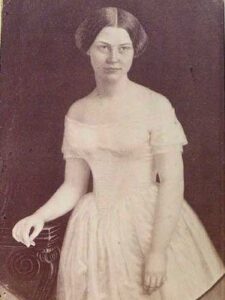 Millard felt he wasn’t learning any skills; his father then sent him to a nearby mill to work. What do you do when you’re stuck in a rut? Some people complain. Millard bought a share in a circulating library and read all the books he could find. And he enrolled in a new academy there in town, and fell in love with his teacher. No inappropriate scandal there; the teacher was Abigail Powers (1798-1853), who eventually became First Lady of the United States, the most scholarly woman to attain that position. She installed the first library in the White House. And Millard became President.
Millard felt he wasn’t learning any skills; his father then sent him to a nearby mill to work. What do you do when you’re stuck in a rut? Some people complain. Millard bought a share in a circulating library and read all the books he could find. And he enrolled in a new academy there in town, and fell in love with his teacher. No inappropriate scandal there; the teacher was Abigail Powers (1798-1853), who eventually became First Lady of the United States, the most scholarly woman to attain that position. She installed the first library in the White House. And Millard became President.
You’ve got to hear this story.
Let’s pick up in Millard’s nineteenth year. The family moved again, and Nathaniel persuaded his landlord, Judge Walter Wood, to allow Millard to clerk for him. Millard read law there, and taught school for a bit, earning enough money to buy out his apprenticeship in 18 months. And the family moved again, settling near Buffalo, New York. Things began to improve, at last. Nathaniel’s farm became prosperous; Millard taught school and continued the study of law. In 1823 he was admitted to the New York bar and established a practice in East Aurora. He and Abigail, after a long courtship, married February 5, 1826 – he was 26, she was 28. They had two children, Millard Powers and Mary Abigail (continuing the naming trend). And Millard’s career took off. I’m giving him PLUS marks so far for trying to please his father, while moving ahead with his own goals. And for marrying a smart woman.
Government Positions
- Member of New York State Assembly, 1828-31
- Member of US House of Representatives, 1833-35
- Member of US House of Representatives, 1837-45
- Comptroller of New York, 1847
- Vice President, 1849-1850 (under Taylor)
- 13th US President, 1850-1853
Millard got interested in politics. He was a delegate to the New York convention that endorsed President John Quincy Adams for reelection. He was elected to the New York State Assembly and served in Albany for three one-year terms. He promoted legislation to provide court witnesses the option of taking a non-religious oath, and for abolishing imprisonment for debt. He moved his successful law practice to Buffalo, which was growing rapidly, and helped draft the city charter. He helped found the Buffalo High School Association, joined the lyceum, attended the Unitarian church. He was active in the New York Militia and attained the rank of major.
As a Congressman he supported building infrastructure, voting in favor of navigation improvements on the Hudson River and constructing a bridge across the Potomac River. He fought for government funds being used to develop the country. He was not in favor of slavery at this time of fierce debate over the issue, but he did not believe it should be a political issue. He grew tired of the political wangling and returned to Buffalo and his law practice in 1843. By that time he was at the height of his popularity and deemed “able in debate, wise in council, and inflexible in his political sentiments.”
So far, good. And then he founded a university. At least, he was involved in the founding of the University of Buffalo in 1846, and became its first chancellor. As to politics, he opposed the annexation of Texas, and spoke against the Mexican-American War; he believed it would extend slavery’s realm. He also spoke out in anger when President Polk vetoed a river and harbors bill that would have benefitted Buffalo, and wrote: “May God save the country for it is evident the people will not.”
It’s hard to imagine, with today’s “campaign fervor” which puts office seekers under relentless second-by-second scrutiny, that in the mid-19th century any candidate wanting high office should not appear to seek it. So when all the back-stage fiddle-faddle finally settled on a Taylor/Fillmore ticket in 1848, Millard remained quiet. Except for a widely published letter he sent to an Alabamian stating that “slavery was an evil, but one that the federal government had no authority over.”
Millard Fillmore was sworn in as vice president on March 5, 1849, in the Senate Chamber. After taking the oath from Chief Justice Roger Taney he swore in the senators beginning their terms. And then, he was largely ignored by Zachary Taylor. Until that day in July 1850 when he was called from his chair while presiding over the Senate to join the vigil outside Taylor’s bedroom at the White House. On July 9 he received official notice of Taylor’s death; after acknowledging the letter and spending a sleepless night, the next day, in a joint session of Congress, he took the oath of office. Now he was President of the United States.
Taylor’s cabinet resigned, as is customary; Millard accept their resignations. Not a good start? He set up his own cabinet; knocking a few heads along the way. When I read about Millard Fillmore’s presidency, one critique is that he didn’t force an agenda in line with his beliefs. Example: his signing of the Fugitive Slave Bill. Fillmore generally signed bills as they reached his desk, but he held the Fugitive Slave Bill for two days until he received a favorable opinion as to its constitutionality from the new Attorney General, John Crittenden. “It is not my job to make the law,” he observed, “but to enforce it.” Basic Civics 101.
Millard was unpopular with northern Whigs for signing and enforcing the Fugitive Slave Act but had considerable support from the South; nevertheless, he wasn’t selected for the 1852 ticket, and Franklin Pierce became President # 14.
Need Work
Millard was out of a job, with no independent wealth, no landed estate, and no pension. He and Abigail planned a tour of the South after leaving the White House, but she caught cold at Franklin Pierce’s inauguration on March 4, 1853, developed pneumonia, and died March 30.
A word about Abigail Powers before I tell you what Millard did next. Abigail was the youngest of seven children; she grew up in Moravia, New York, not far from the Fillmore farm. Her father died shortly after she was born, but left behind a large library; her mother used the books to educate her children beyond the usual frontier level. Abigail came to love literature, but also became proficient in math, government, history, philosophy, and geography. She became a teacher, and was asked to open a private school; in 1819 she took a post at a new academy where her oldest pupil was 19-year-0ld Millard Filmore. Their love of learning is one thing that drew them together and to marriage in 1826. She continued teaching until their son was born.
Abigail learned the ways of society as the wife of a Congressman, but much of her time, as always, she spent reading. An injured ankle that never properly healed rendered her unable to stand for long periods of time, so on becoming First Lady in 1850 at age 52, she entrusted many routine social duties to her daughter Abby. She was appalled to learn that there was no library in the White House, so with a special appropriation from Congress of $2,000, she spent her time selecting books and building a library. Shakespeare, history and geography books, and her piano graced the library; she taught herself to play. She invited writers such as William Thackeray, Charles Dickens, and Washington Irving to meet with her; she invited performance artists such as Jenny Lind to come; she created a White House literary salon. She was reportedly a witty and erudite conversationalist, the most intellectual of the early first ladies.
She offered Millard advice and counsel on political matters; reportedly he never made any important decision without first consulting her. It is said she advised him not to sign the Fugitive Slave Bill; she predicted what would happen if he did, and she was right. Abigail left behind a legacy of women and work.
Moving On
Millard Fillmore returned to Buffalo for Abigail’s burial, but his grieving was not yet done. The very next year his daughter Abby died of cholera. So Millard spent over a year abroad, visiting Europe and the Middle East. Queen Victoria called him handsome; he had an audience with Pope Pius IX; he was offered an honorary Doctor of Civil Law degree by the University of Oxford. He declined, explaining he had neither the “literary nor scientific attainment” to justify the degree. And while he was away, the Know Nothing Party put him on the 1856 ticket. James Buchanan won with 174 electoral votes; the Fillmore/Donelson third-party ticket came in third.
Millard had not sought to be on the ticket in the first place; but felt that his political career had truly ended with that; and he wasn’t really interested in continuing the practice of law. So he got married again; this time to a wealthy widow, Caroline McIntosh (1813-1881), where, as the story ends, they lived happily ever after, devoting themselves to entertaining and philanthropy, “generously supporting every conceivable cause,” such as the Buffalo General Hospital, which Millard helped found.
Millard Fillmore died March 8, 1874, at the age of 74. He may not have been the most exuberant or dashing of presidents, but he didn’t violate his principles, and he did some good things in his lifetime.
Way more pluses than minuses.
» posted on Wednesday, June 26th, 2024 by Linda Lou Burton
#12. Taylor, Zachary
Linda Lou Burton posting from Little Rock, Arkansas –Zachary Taylor (November 24, 1784 – July 9, 1850) was the 12th president of the United States, serving from March 1849 until his death in July 1850. Yes, another president died in office. And under mysterious circumstances – there is still suspicion about the cause of his death. Strange that he died right after a picnic at the Washington Monument on a sunny day in July. And especially odd, since the man spent most of his 39-year military career fighting in battles that would have caused most folks to turn tail and run. But Zachary Taylor was a Clint Eastwood movie waiting to be made. A series of MAKE MY DAY events that, on paper, sound like tall tales. Surely it was fiction? No, it was not. Every one of his battle stories from the War of 1812, the Black Hawk War, the Second Seminole War, and the Mexican-American War would keep any fan of war movies so engrossed they’d forget to eat their popcorn. Pretty much all of them were “against the odds” encounters, but “Old Rough and Ready” Eastwood-Taylor always managed to beat those odds. Take the 1812 Siege of Fort Harrison, for example. Scene: Captain Taylor assigned to escort 80 men, women, and children from Fort Knox to Fort Harrison and take command there. The group was struck by malaria and many died along the way. Taylor was ill when he arrived, and learned that Indian forces planned to attack the Fort. Roll the reel.
 Only fifteen of the remaining men were soldiers; the rest were civilians or soldiers too ill to fight. Taylor recruited five civilians and gave the twenty men sixteen rounds of ammunition. Around midnight, they were awakened by fire. Taylor saw the flaming fort as an opportunity – the fire lit up the sky and revealed the attackers! Put out the fire, and shoot the attackers was Taylor’s plan and yes, the fire was put out and the 600 Miami, Potawatomi, Kickapoo, and Winnebago warriors retreated. Action scenes include civilian Julia Lambert lowering herself into the Fort’s well to fill buckets more quickly for the fire brigade, panicked shooting and shouting, and at the end, the daylight approach of Chief Namahtoha with a flag of truce.
Only fifteen of the remaining men were soldiers; the rest were civilians or soldiers too ill to fight. Taylor recruited five civilians and gave the twenty men sixteen rounds of ammunition. Around midnight, they were awakened by fire. Taylor saw the flaming fort as an opportunity – the fire lit up the sky and revealed the attackers! Put out the fire, and shoot the attackers was Taylor’s plan and yes, the fire was put out and the 600 Miami, Potawatomi, Kickapoo, and Winnebago warriors retreated. Action scenes include civilian Julia Lambert lowering herself into the Fort’s well to fill buckets more quickly for the fire brigade, panicked shooting and shouting, and at the end, the daylight approach of Chief Namahtoha with a flag of truce.
Would I invite this man to my party? Darn tootin’, especially if I had pesky neighbors that were always messing with my fort. Would you?
What Kind of Person
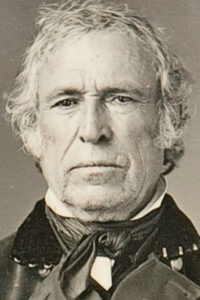 Zachary Taylor was a great soldier, and leader, if you asked his men. He marched through the woods or the swamps or the desert right alongside them. If you asked his superiors, you might get a different answer. Yes, he won battles, but he refused to dress up. He looked more like a farmer than a sharply dressed military man. He wore straw hats and dirty old boots and always had a grizzled rough and rowdy look. So how did he wind up as President of the United States?
Zachary Taylor was a great soldier, and leader, if you asked his men. He marched through the woods or the swamps or the desert right alongside them. If you asked his superiors, you might get a different answer. Yes, he won battles, but he refused to dress up. He looked more like a farmer than a sharply dressed military man. He wore straw hats and dirty old boots and always had a grizzled rough and rowdy look. So how did he wind up as President of the United States?
Zachary Taylor was born on a plantation in Orange County, Virginia, to a prominent family of planters. He was the third of five surviving sons in his family and had three younger sisters. His father Richard served as a lieutenant colonel in the American Revolution. A lot of name dropping with connections to the Mayflower; the family tree shows lines to James Madison and Robert E Lee. When that Virginia land became exhausted, Zachary’s family joined the westward migration and settled in Kentucky, on the Ohio River. Zachary was just a baby at the time, first they lived in a woodland cabin, then eventually as fortunes increased, a brick house. The town of Louisville grew rapidly and the family’s holdings increased to 10,000 acres and 26 slaves. Kentucky’s education system was just taking shape, so Zachary’s formal 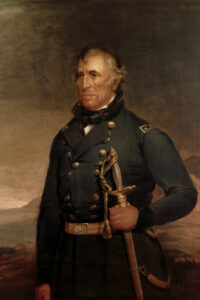 education was sporadic; his mother taught him to read and write and he received some training from classically trained scholars migrating west.
education was sporadic; his mother taught him to read and write and he received some training from classically trained scholars migrating west.
His Army career began in 1808 at the age of 23, one of the first new officers commissioned by Congress after an American frigate was boarded by the crew of a British warship. Wars and rumors of wars formed the direction of his life until he retired in 1848 after receiving three Congressional Gold Medals for his service in the Mexican-American War; the stage was set for a presidential election.
In between battles and wars he purchased a good deal of bank stock in Louisville, bought a plantation there and another in Mississippi Territory, and acquired more than 200 slaves. He also got married and fathered six children with Margaret Mackall Smith (1788-1852). Peggy came from a prominent family of Maryland planters; she and Zachary met in Louisville and married in June 1810. Three of their daughters lived to adulthood; son Richard became a Confederate Army general.
In all those years as a career officer, Zachary never publicly revealed his political beliefs, and he never voted. He thought of himself as an independent and believed it was impractical to expand slavery into the western areas of the country, as neither cotton nor sugar could easily be grown there through a plantation economy. He was a firm nationalist; due to his experience of seeing so many die as a result of warfare, he believed secession was not a good way to resolve national problems.
Presidential Days
 The Whig Party convinced him to lead their ticket in 1848 despite his unclear political tenets and lack of interest in politics. And Zachary Taylor became the first president to be elected without having served in a prior political office, winning with 163 electoral votes to Lewis Cass’ 127.
The Whig Party convinced him to lead their ticket in 1848 despite his unclear political tenets and lack of interest in politics. And Zachary Taylor became the first president to be elected without having served in a prior political office, winning with 163 electoral votes to Lewis Cass’ 127.
Zachary headed for Washington in late January – due to bad weather, illness, delays, and even a kidnapping by a friend as a joke it took a month to get there; though he officially became president Sunday, March 4, his inauguration took place the next day due to religious considerations. His inauguration speech discussed the many tasks facing the nation; after his inauguration, he made time to meet with numerous office-seekers and ordinary citizens who desired his attention. He also attended a number of funerals, including services for former president Polk and for Dolley Madison. Throughout the summer of 1849, he toured the northeastern states to familiarize himself with the region.
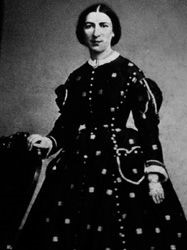 Margaret Taylor had literally prayed for her husband’s defeat, dreading the personal consequences of his presidency. The hardships of following him from fort to fort and caring for their children had taken their toll; she was a semi-invalid by the time she arrived at the White House, and remained on the second floor, leaving the duties of official hostess to their daughter Mary Elizabeth Bliss.
Margaret Taylor had literally prayed for her husband’s defeat, dreading the personal consequences of his presidency. The hardships of following him from fort to fort and caring for their children had taken their toll; she was a semi-invalid by the time she arrived at the White House, and remained on the second floor, leaving the duties of official hostess to their daughter Mary Elizabeth Bliss.
Zachary Taylor didn’t die on July 4, as three of his predecessors did, but he did get sick. That afternoon at the holiday event taking place across the street from the White House, where the Washington Monument was under construction, he overdid it. Some stories say it was cherries he ate. Way too many cherries for a man who’d always suffered from gastrointestinal problems. And since it was hot that day, he then consumed iced milk. It was several days before he became seriously ill and developed a fever. The doctors tried everything they knew, but on July 8 he remarked to an attendant:
“I should not be surprised if this were to terminate in my death. I did not expect to encounter what has beset me since my elevation to the Presidency. God knows I have endeavored to fulfill what I conceived to be an honest duty. But I have been mistaken. My motives have been misconstrued, and my feelings most grossly outraged.”
This is one battle “Old Rough and Ready” didn’t win. He died the next day, July 9, 1850, at the age of 65, and was interred in the Public Vault of the Congressional Cemetery in Washington until October, when his body was transported to the Taylor family plot in Kentucky. Almost immediately after his death, rumors began to circulate that he was poisoned by pro-slavery Southerners; his body was exhumed in 1991 and radiological studies were conducted of samples of hair, fingernail, and other tissues. Neutron activation analysis conducted at Oak Ridge National Laboratory revealed no evidence of poisoning, as arsenic levels were too low and concluded he contracted “cholera morbus, or acute gastroenteritis.” Speculation continues; a 2010 review states “there is no definitive proof that Taylor was assassinated, nor would it appear that there is definitive proof that he was not.”
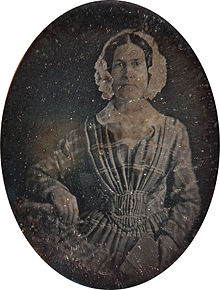 Margaret Taylor’s health deteriorated rapidly after Zachary’s death; she died two years later in Mississippi and is buried in Kentucky next to her husband. Few pictures are available of her, some have surfaced on the collector’s market but not been authenticated. Little has been written about her; here is an article from a newspaper social column when Zachary was being considered for the presidency:
Margaret Taylor’s health deteriorated rapidly after Zachary’s death; she died two years later in Mississippi and is buried in Kentucky next to her husband. Few pictures are available of her, some have surfaced on the collector’s market but not been authenticated. Little has been written about her; here is an article from a newspaper social column when Zachary was being considered for the presidency:
MRS. GENERAL TAYLOR AND DAUGHTER.-—At a late ball, at East Pascagoula [Mississippi], General Taylor, his lady and daughter and Major Bliss, were present. Of them a correspondent of the Mobile Herald writes as follows:— Mrs. Gen. T.—Dress plain, and in good taste; manners dignified and easy, countenance rather stern but it may be the consequence of military association. Person tall and commanding, demeanor retiring, with no palpable predilection for high station; and, judging from appearance, one would suppose the White House offers no peculiar attractions to Mrs. Gen. T., and if her ‘liege lord’ would listen to her sage and wel[l]-considered counsel, it is not unlikely he wou[l]d be content to remain as Gen. T.
No doubt true. And he would have made a great movie star.
» posted on Tuesday, June 25th, 2024 by Linda Lou Burton
#11. Polk, James Knox
 Linda Lou Burton posting from Little Rock, Arkansas –James Knox Polk (November 2, 1795 – June 15, 1849) was the 11th president of the United States (1845 to 1849). Two things pop to the top of James’ resume when I read about his life. For one, he actually WAS born in a Log Cabin. Not on a James River plantation, or the make-believe log cabin used for W H Harrison’s campaign. James Polk really was born in a log cabin in North Carolina, the first of ten kids. I’ll get back to that in a minute, but you can visit a reconstruction of it today, should you doubt. The second notable thing that stands out about James is his Bucket List. Yes, James had one when he got to the White House, and he just sat there and ticked off items one by one till they were done. Imagine that! So – remember these four words for the quiz at the end – Log-Cabin-Bucket-List. I’ve been to James’ grave on the capitol grounds in Nashville; folks are pretty proud of him there, although the state’s
Linda Lou Burton posting from Little Rock, Arkansas –James Knox Polk (November 2, 1795 – June 15, 1849) was the 11th president of the United States (1845 to 1849). Two things pop to the top of James’ resume when I read about his life. For one, he actually WAS born in a Log Cabin. Not on a James River plantation, or the make-believe log cabin used for W H Harrison’s campaign. James Polk really was born in a log cabin in North Carolina, the first of ten kids. I’ll get back to that in a minute, but you can visit a reconstruction of it today, should you doubt. The second notable thing that stands out about James is his Bucket List. Yes, James had one when he got to the White House, and he just sat there and ticked off items one by one till they were done. Imagine that! So – remember these four words for the quiz at the end – Log-Cabin-Bucket-List. I’ve been to James’ grave on the capitol grounds in Nashville; folks are pretty proud of him there, although the state’s 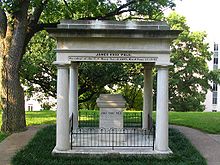 electoral votes didn’t go to him in the 1844 election; neither did North Carolina’s, his birth state. But enough state electorals did – it was close, but Democrat Polk received 170 to Whig Clay’s 105. That was the 1844 ticket, after the poker game in the back room where Martin Van Buren and John Tyler and Andrew Jackson and all the others who were arguing over Texas and slavery and Manifest Destiny ended, and the campaign moved forward. James went to the White House with the promise to them all: I’m just staying four years, and I’m outta here. James did exactly what he said he would, tick, tick, tick. And it wore the man to a frazzle. But I’m getting ahead of the story. Question: Would you invite this man to your party? I definitely would, I mean, maybe I could learn a few organizational skills from this guy, my Bucket List seems to be slow going.
electoral votes didn’t go to him in the 1844 election; neither did North Carolina’s, his birth state. But enough state electorals did – it was close, but Democrat Polk received 170 to Whig Clay’s 105. That was the 1844 ticket, after the poker game in the back room where Martin Van Buren and John Tyler and Andrew Jackson and all the others who were arguing over Texas and slavery and Manifest Destiny ended, and the campaign moved forward. James went to the White House with the promise to them all: I’m just staying four years, and I’m outta here. James did exactly what he said he would, tick, tick, tick. And it wore the man to a frazzle. But I’m getting ahead of the story. Question: Would you invite this man to your party? I definitely would, I mean, maybe I could learn a few organizational skills from this guy, my Bucket List seems to be slow going.
Two Words – Log Cabin
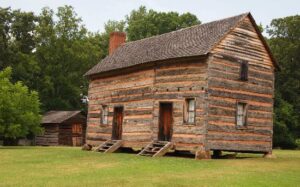 When James was born in that log cabin in Pineville, North Carolina in 1795, his parents had a disagreement right away. Father Samuel refused to declare his belief in Christianity at James’ baptism. Samuel’s own father was a deist who rejected dogmatic Presbyterianism; so Samuel stood firm that day, and the minister would not baptize James. Jane Knox Polk, James’ mother, nevertheless stamped her beliefs on her son – instilling in him the traits of hard work, self-discipline, and individualism. And nine more children were born to Samuel and Jane. They moved to Maury County Tennessee in 1806 when James was eleven; James’ health was frail; he wound up having an operation for urinary stones when he was sixteen. His health improved, though it is believed the operation made him sterile; he fathered no children in his 53 years.
When James was born in that log cabin in Pineville, North Carolina in 1795, his parents had a disagreement right away. Father Samuel refused to declare his belief in Christianity at James’ baptism. Samuel’s own father was a deist who rejected dogmatic Presbyterianism; so Samuel stood firm that day, and the minister would not baptize James. Jane Knox Polk, James’ mother, nevertheless stamped her beliefs on her son – instilling in him the traits of hard work, self-discipline, and individualism. And nine more children were born to Samuel and Jane. They moved to Maury County Tennessee in 1806 when James was eleven; James’ health was frail; he wound up having an operation for urinary stones when he was sixteen. His health improved, though it is believed the operation made him sterile; he fathered no children in his 53 years.
James learned “politics” around the dinner table; the Polk clan dominated politics there and folks like Andrew Jackson were frequent guests. Father Samuel was a county judge, among other things; he offered to bring James into one of his businesses but James wanted an education first. Bradley Academy in Murfreesboro; then on to University of North Carolina in Chapel Hill. James joined the Dialectic Society and took part in debates; he graduated with honors in 1818, age 23. Back to Nashville to study law; he served as clerk of the Tennessee State Senate, and was admitted to the Tennessee Bar in 1820. First case: he defended his 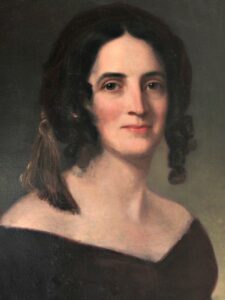 father against a public fighting charge! He secured Samuel’s release for a $1 fine. James built a successful law practice, and (maybe a Bucket List item) he got married.
father against a public fighting charge! He secured Samuel’s release for a $1 fine. James built a successful law practice, and (maybe a Bucket List item) he got married.
Sarah Childress (1803-1891) was well educated; in fact, she and James first crossed paths at school in Murfreesboro. She went on to attend the exclusive Salem Academy in North Carolina, one of the few institutions of higher learning available to women at the time. James and Sarah were formally introduced when he was involved with the State Legislature; they married on January 1, 1824 – he was 28, she was 20. It is said that Andrew Jackson encouraged the marriage, calling Sarah “pretty, ambitious, and intelligent.” During James’ political career Sarah assisted him with his speeches, gave him advice on policy matters, and played an active role in his campaigns.
Government Positions
- Member of Tennessee House of Representatives, 1823-25
- Member of US House of Representatives, 1825-39
- Speaker of the House, 1835-39
- Governor of Tennessee, 1839-41
- Eleventh President of the United States, 1845-49
Two Words – Bucket List
On March 4, 1845, James Knox Polk was inaugurated as the 11th US President, and Sarah became a First Lady. James’ Bucket List had four items:
- Reestablish the Independent Treasury System – the Whigs had abolished the one created under Van Buren.
- Reduce tariffs.
- Acquire some or all of the Oregon Country.
- Acquire California and its harbors from Mexico.
Sarah had an agenda as well. One was to keep James healthy and to caution him against overwork. Another was to oversee a quieter White House than Julia Tyler left behind. She banned dancing, card games, and hard liquor at official receptions; her dinners were sedate and sober affairs. So James got to work.
Historians today praise James Polk for meeting every goal he set. He was presiding over a country whose population had doubled every twenty years since the American Revolution, so now had demographic parity with Great Britain. He reached a settlement with Great Britain over the disputed Oregon Country. He achieved a sweeping victory in the Mexican-American War, resulting in the cession by Mexico of nearly all the American Southwest. He secured a substantial reduction of tariff rates in 1846; and in that same year, re-established the Independent Treasury system. James accomplished all of this “hands-on” – for example, he directed the Mexican-American War from “grand strategy to the procurement of mules.” And as I said in the beginning, it wore him to a frazzle.
After All Is Said and Done
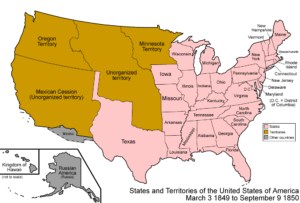 True to his campaign promise and Bucket List completed, James departed after one term, leaving behind a country that stretched to the Pacific Coast and was poised to be a world power. After attending the inauguration of Zachary Taylor on March 5, 1849, James and Sarah headed for Nashville. They traveled down the Atlantic coast; then westward through the deep south, enthusiastically received and banqueted along the way. By the time they reached Alabama, James was suffering from a cold and they were hearing reports of cholera. It was rumored to be common in New Orleans, but it was too late for them to change plans. Several passengers on the Mississippi riverboat died of the disease; James was so ill he went ashore for a few days but was assured he did not have cholera, so they made the final leg, arriving in Nashville April 2 to a huge reception. James and Sarah spent a few weeks visiting family in
True to his campaign promise and Bucket List completed, James departed after one term, leaving behind a country that stretched to the Pacific Coast and was poised to be a world power. After attending the inauguration of Zachary Taylor on March 5, 1849, James and Sarah headed for Nashville. They traveled down the Atlantic coast; then westward through the deep south, enthusiastically received and banqueted along the way. By the time they reached Alabama, James was suffering from a cold and they were hearing reports of cholera. It was rumored to be common in New Orleans, but it was too late for them to change plans. Several passengers on the Mississippi riverboat died of the disease; James was so ill he went ashore for a few days but was assured he did not have cholera, so they made the final leg, arriving in Nashville April 2 to a huge reception. James and Sarah spent a few weeks visiting family in 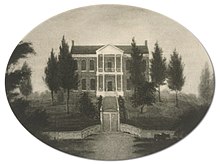 Murfreesboro and Columbia before settling down in Polk Place, their new home. In early June, James fell ill again. Attended by doctors, he asked to be baptized into the Methodist church, which he had long admired (his infant baptism didn’t happen, as you may recall). He lingered for several days, but on the afternoon of June 15, he died, after uttering these words to Sarah: “I love you Sarah, for all eternity, I love you.”
Murfreesboro and Columbia before settling down in Polk Place, their new home. In early June, James fell ill again. Attended by doctors, he asked to be baptized into the Methodist church, which he had long admired (his infant baptism didn’t happen, as you may recall). He lingered for several days, but on the afternoon of June 15, he died, after uttering these words to Sarah: “I love you Sarah, for all eternity, I love you.”
James Knox Polk was the youngest president, taking office at 49; he died at 53 after the shortest retirement of any president – three months. Sarah lived at Polk Place for 42 years until her death in 1891 at the age of 87; the longest widowhood of any First Lady. She always wore black, as a true Victorian widow.
An interesting note about James’ three burials – he was first buried in what is now Nashville City Cemetery due to a legal requirement related to his infectious disease death identified as cholera. In 1850 he was moved to a tomb on the grounds of Polk Place as specified in his will. In 1893, the bodies of James and Sarah Polk were relocated to the current resting place on the grounds of the Tennessee State Capitol.
What are the four words you’ll remember about James Polk?
A Very Personal Note
My third-great-grandfather, William Irwin, and nine others in a party of sixteen, died of cholera in that 1849 epidemic that killed James Polk. They were emigrating from Alabama to the new state of Texas, which was admitted to the Union on December 25, 1845, during James Polk’s term. They died along the trail in Clark County, Arkansas, near where I live today. I am in possession of William Irwin’s Journal, describing life during Polk’s term, and their fateful journey on the way to Texas. Publishing that journal, and establishing historical markers for the cemetery in which the ten are buried, are two major items on my Bucket List.
» posted on Monday, June 24th, 2024 by Linda Lou Burton
#10. Tyler, John
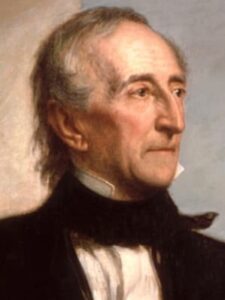 Linda Lou Burton posting from Little Rock, Arkansas –John Tyler (March 29, 1790 – January 18, 1862) was the tenth president of the United States (1841 to 1845). He was also the tenth vice-president, and the first president not to BE elected, which led to the nickname “His Accidency.” He got himself sworn in pretty quickly while Congress was still scratching their heads over what to do when a president DIES, the rules weren’t clear on that issue. Turmoil! He moved into the White House with one notion in his head: HE was supposed to make the rules, not Congress. He also didn’t want his Cabinet to boss him around, or the Whigs that had fought so hard with those log cabin images to get the Harrison/Tyler ticket ensconced in Washington. Very quickly the Cabinet resigned, and his own party kicked him out! Yes, he was “party-less” which leads to a very bad joke before I ask if you’d invite him to your party. You see, John’s first wife, Letitia, had a stroke before the White House days, so was unable to take care of First Lady duties. Sadly, she died in the White House while all these other people were backing away from John; so John, being 54 at the time, did what you might expect – he married a young and pretty thing who LOVED to give elegant parties in the White House. The folktale (joke) is that John said: Now they can’t call me a man without a party. Do you believe he said that? Maybe it’s just another Pet Alligator or Cherry Tree myth, but it could have happened. Especially when you hear about Julia’s parties; I find John’s First Ladies are even more interesting than the politics of the day. Would I invite him to my party? I’ll answer when I get to the end.
Linda Lou Burton posting from Little Rock, Arkansas –John Tyler (March 29, 1790 – January 18, 1862) was the tenth president of the United States (1841 to 1845). He was also the tenth vice-president, and the first president not to BE elected, which led to the nickname “His Accidency.” He got himself sworn in pretty quickly while Congress was still scratching their heads over what to do when a president DIES, the rules weren’t clear on that issue. Turmoil! He moved into the White House with one notion in his head: HE was supposed to make the rules, not Congress. He also didn’t want his Cabinet to boss him around, or the Whigs that had fought so hard with those log cabin images to get the Harrison/Tyler ticket ensconced in Washington. Very quickly the Cabinet resigned, and his own party kicked him out! Yes, he was “party-less” which leads to a very bad joke before I ask if you’d invite him to your party. You see, John’s first wife, Letitia, had a stroke before the White House days, so was unable to take care of First Lady duties. Sadly, she died in the White House while all these other people were backing away from John; so John, being 54 at the time, did what you might expect – he married a young and pretty thing who LOVED to give elegant parties in the White House. The folktale (joke) is that John said: Now they can’t call me a man without a party. Do you believe he said that? Maybe it’s just another Pet Alligator or Cherry Tree myth, but it could have happened. Especially when you hear about Julia’s parties; I find John’s First Ladies are even more interesting than the politics of the day. Would I invite him to my party? I’ll answer when I get to the end.
Before I tell you how John’s life began, there is one amazing thing about its ending that I want you to keep in mind. He is the only US President whose death was not officially recognized in Washington. When he was laid to rest in 1862, his coffin was draped in a Confederate flag.
From There to the Beginning
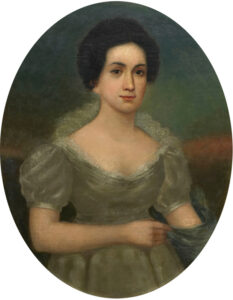 John and his two brothers and five sisters grew up on Greenway Plantation, a 1,200-acre Virginia estate. His father John Sr was a college roommate of Thomas Jefferson at William & Mary and had several political appointments before becoming a Judge. He paid high wages for good tutors to challenge his children academically; he sent John to Prep School at William & Mary at the age of 12; John passed the Virginia Bar at the age of 19. By this time John Sr was Governor of Virginia, and John opened a law practice in Richmond. At the age of 23 he bought a plantation, settled down with his new wife Letitia Christian (1790-1842), and began raising a family. John and Letitia had eight children together; seven lived to adulthood. Letitia was from a prosperous family too; she was shy, quiet, and devoted to her family. Their 29-year marriage appears to have been a happy one. Letitia avoided the limelight during John’s career and at the age of 49 suffered a paralytic stroke. As first lady, she remained in the upstairs living quarters of the White House, coming down only once to attend the wedding of daughter Elizabeth in January 1842. She died that September.
John and his two brothers and five sisters grew up on Greenway Plantation, a 1,200-acre Virginia estate. His father John Sr was a college roommate of Thomas Jefferson at William & Mary and had several political appointments before becoming a Judge. He paid high wages for good tutors to challenge his children academically; he sent John to Prep School at William & Mary at the age of 12; John passed the Virginia Bar at the age of 19. By this time John Sr was Governor of Virginia, and John opened a law practice in Richmond. At the age of 23 he bought a plantation, settled down with his new wife Letitia Christian (1790-1842), and began raising a family. John and Letitia had eight children together; seven lived to adulthood. Letitia was from a prosperous family too; she was shy, quiet, and devoted to her family. Their 29-year marriage appears to have been a happy one. Letitia avoided the limelight during John’s career and at the age of 49 suffered a paralytic stroke. As first lady, she remained in the upstairs living quarters of the White House, coming down only once to attend the wedding of daughter Elizabeth in January 1842. She died that September.
Below you can see the work John was doing before, during, and after his marriage to Letitia, and then to Julia.
Government Positions
- Member of Virginia House of Delegates, 1811-16
- Member of US House of Representatives, 1816-21
- Virginia State Legislator, 1823-25
- Governor of Virginia, 1825-26
- United States Senator, 1827-36
- Vice President, 1841 (under Harrison)
- Tenth President of the United States, 1841-1845
- Member of Confederate States Congress, 1861-62
Yes, John remarried. We’ll give him credit for grieving over Letitia’s death; by all accounts he truly loved her. But it didn’t take long for Julia Gardiner (1820-1889) to strike her mark. She was a New York socialite from a wealthy family and at 22, had already made a reputation as a free-spirited woman. She secretly arranged to appear as a model in a lithograph for a New York department store when she was a teen; her parents sent her away to Europe for a while, but she had already earned a nickname: The Rose of Long Island.
Movie Making Time
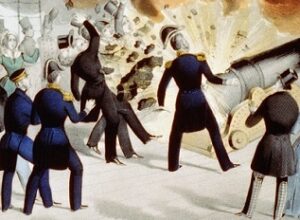 Many HBO movies have plots like this one; mid-life man recently bereaved, friendless, and unpopular at work meets adventurous young woman who rejects his advances with fluttering eyelashes, until, The Day On The Boat. On February 28, 1844, when the Gardiner family was once again visiting Washington, John invited them to a party on a US Navy frigate, the USS Princeton. Four hundred guests were steaming down the Potomac, entertained by the test firings of the “Peacemaker,” a mammoth 13-ton naval gun that lobbed 225-pound cannonballs. Then a horrific accident; the breech exploded and sent shrapnel flying across the deck. Six people were killed – including the Secretary of State, Secretary of the Navy, and Julia’s father, David Gardiner. Julia fainted; John carried her in his arms to a rescue ship.
Many HBO movies have plots like this one; mid-life man recently bereaved, friendless, and unpopular at work meets adventurous young woman who rejects his advances with fluttering eyelashes, until, The Day On The Boat. On February 28, 1844, when the Gardiner family was once again visiting Washington, John invited them to a party on a US Navy frigate, the USS Princeton. Four hundred guests were steaming down the Potomac, entertained by the test firings of the “Peacemaker,” a mammoth 13-ton naval gun that lobbed 225-pound cannonballs. Then a horrific accident; the breech exploded and sent shrapnel flying across the deck. Six people were killed – including the Secretary of State, Secretary of the Navy, and Julia’s father, David Gardiner. Julia fainted; John carried her in his arms to a rescue ship.
So Julia married a man 30-years her senior less than four months later, in a secret ceremony in New York. And the comments began. John Quincy Adams called them “the laughing-stock of the city,” and “the old fable of January and May.” Another critic called John Tyler a “deluded jackass.” Nevertheless, the couple had seven children together, the last when John was 70! Yes, he had FIFTEEN children in all, the most of any US President. To date, at least.
John was still in dire political straits, but didn’t seem to care; he was often seen cozying up to Julia in public. And in the remaining eight months of John’s presidency, she glitzed up the White House in ways never seen before.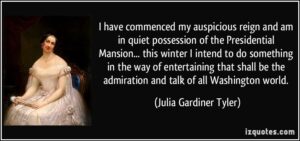
Julia hosted extravagant parties that featured champagne and polka dancing. She insisted that the Marine Band play “Hail to the Chief” whenever John arrived at official functions. She wore exotic clothing, traveled in a carriage pulled by Arabian horses, and appeared at balls flanked by white-clad maids of honor. She secured a publicity deal with a New York newspaper columnist, who called her “Lady Presidentress.”
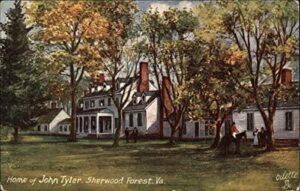 John Tyler wasn’t interested in a second term; he and Julia retired to a Virginia plantation that he named Sherwood Forest – as a “Robin Hood” outlawed by the Whigs. In an effort to mock him, his neighbors appointed him to the minor office of overseer of roads; he took the job seriously, as he did farming his plantation, working hard to maintain large yields. Julia continued hosting parties; they spent their summers at their seaside home. John withdrew from politics until 1861, when local voters elected him to the Virginia Secession Convention. On April 4 he voted for secession; on April 17, after the attack on Fort Sumter and Lincoln’s call for troops, he headed a committee that negotiated the terms for Virginia’s entry into the Confederate States of America. On June 14, he signed the Ordinance of Secession, and one week later the convention unanimously elected him to the Provisional Confederate Congress. Tyler was seated in the Confederate Congress on August 1, 1861, and he served until just before his death in 1862.
John Tyler wasn’t interested in a second term; he and Julia retired to a Virginia plantation that he named Sherwood Forest – as a “Robin Hood” outlawed by the Whigs. In an effort to mock him, his neighbors appointed him to the minor office of overseer of roads; he took the job seriously, as he did farming his plantation, working hard to maintain large yields. Julia continued hosting parties; they spent their summers at their seaside home. John withdrew from politics until 1861, when local voters elected him to the Virginia Secession Convention. On April 4 he voted for secession; on April 17, after the attack on Fort Sumter and Lincoln’s call for troops, he headed a committee that negotiated the terms for Virginia’s entry into the Confederate States of America. On June 14, he signed the Ordinance of Secession, and one week later the convention unanimously elected him to the Provisional Confederate Congress. Tyler was seated in the Confederate Congress on August 1, 1861, and he served until just before his death in 1862.
He died of a stroke in his room at the Ballard Hotel in Richmond January 18, 1862 before the first session opened in February. He was 71; his youngest child Pearl was two. Julia died at the same hotel 27 years later, also suffering a stroke. Though John’s death was not officially recognized in Washington because of his allegiance to the Confederate States of America, Confederate President Jefferson Davis devised a grand funeral, painting him as a hero to the new nation. John Tyler remains the only US president ever laid to rest under a flag not of the United States.
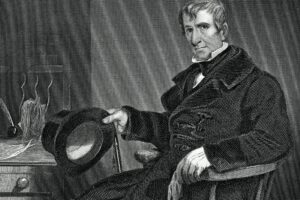 John Tyler is portrayed as one of the nation’s most obscure presidents; “the rhyming end of a catchy campaign slogan.” Still, positive legislation was passed during his term – the “Log-Cabin” bill enabled a settler to claim 160 acres of land before it was offered publicly for sale, and later pay $1.25 an acre for it; and in 1842 a tariff bill protecting northern manufacturers. The Webster-Ashburton treaty ended a Canadian boundary dispute; in 1845 Texas was annexed.
John Tyler is portrayed as one of the nation’s most obscure presidents; “the rhyming end of a catchy campaign slogan.” Still, positive legislation was passed during his term – the “Log-Cabin” bill enabled a settler to claim 160 acres of land before it was offered publicly for sale, and later pay $1.25 an acre for it; and in 1842 a tariff bill protecting northern manufacturers. The Webster-Ashburton treaty ended a Canadian boundary dispute; in 1845 Texas was annexed.
I think I’d invite him to my party, he wasn’t such a bad guy when he got away from politics. We’d probably talk about our kids.
» posted on Sunday, June 23rd, 2024 by Linda Lou Burton
#9. Harrison, William Henry
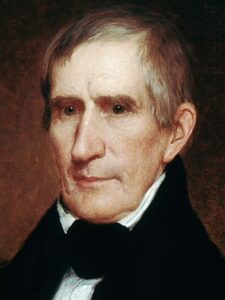 Linda Lou Burton posting from Little Rock, Arkansas –William Henry Harrison (February 9, 1773 – April 4, 1841) was the ninth president of the United States. For a month, in 1841. Thirty-one days into his term he became the first president to die in office and the shortest-serving president in US history. Do you know why? I’m laying it all to Karma. The more I study presidents, and presidential elections, the more I see evidence of “reaping what one sows.” William wasn’t a bad sort; he was born into the Virginia gentry with plantation living alongside the James River. His father signed the Declaration of Independence, and was governor of Virginia during the Revolutionary War. Benjamin Harrison took good care of his son; William was tutored at home until he was 14; then a classic education – Latin and Greek and logic and debate – at a college there in Virginia. Off to the University of Pennsylvania at the age of 18 to study medicine. So how did William wind up dead as a doornail just after getting himself elected president of the
Linda Lou Burton posting from Little Rock, Arkansas –William Henry Harrison (February 9, 1773 – April 4, 1841) was the ninth president of the United States. For a month, in 1841. Thirty-one days into his term he became the first president to die in office and the shortest-serving president in US history. Do you know why? I’m laying it all to Karma. The more I study presidents, and presidential elections, the more I see evidence of “reaping what one sows.” William wasn’t a bad sort; he was born into the Virginia gentry with plantation living alongside the James River. His father signed the Declaration of Independence, and was governor of Virginia during the Revolutionary War. Benjamin Harrison took good care of his son; William was tutored at home until he was 14; then a classic education – Latin and Greek and logic and debate – at a college there in Virginia. Off to the University of Pennsylvania at the age of 18 to study medicine. So how did William wind up dead as a doornail just after getting himself elected president of the 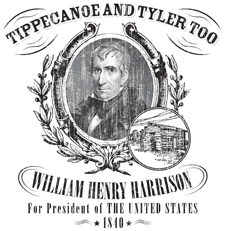 United States? And how did he wind up being thought of by the voting public as a sharp-shooting cider-sipping Daniel Boone look-a-like, with a lot of dead Indians in his wake? In perhaps one of the tackiest campaign farces ever devised, in that 1840 election that pitted him against “wealthy elitist” Martin Van Buren, William’s party, the Whigs, came up with this little ditty: “Old Tip he wore a homespun coat, he had no ruffled shirt: wirt wirt, But Mart he has the golden plate, and he’s a little squirt.” Wirt wirt.
United States? And how did he wind up being thought of by the voting public as a sharp-shooting cider-sipping Daniel Boone look-a-like, with a lot of dead Indians in his wake? In perhaps one of the tackiest campaign farces ever devised, in that 1840 election that pitted him against “wealthy elitist” Martin Van Buren, William’s party, the Whigs, came up with this little ditty: “Old Tip he wore a homespun coat, he had no ruffled shirt: wirt wirt, But Mart he has the golden plate, and he’s a little squirt.” Wirt wirt.
Not something I’d expect you to know, but when you spit tobacco juice it goes “wirt wirt.” And the “Tip” referral was William’s nickname after the Battle of Tippecanoe, where he left that trail of dead Indians, to the delight of settlers moving west. Would you invite William to your party? I wouldn’t. Not because I wouldn’t abide tobacco spittin’ in my house (he didn’t actually DO that, his supporters did); but because he never lived in a log cabin and did not partake of alcoholic beverages, even though he allowed himself to be portrayed that way because he wanted to be president. He’d probably schmooze me up about my hors d’oeuvres!
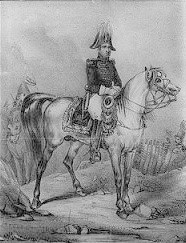 Well, okay, I do cut him some slack about what he had to do when his father died; that’s sad. He’d just gotten settled in medical school and wham – no money for further schooling. So he joined the Army. He was assigned to Fort Washington, Cincinnati in the Northwest Territory where the army was engaged in the ongoing Northwest Indian War. And he did a lot of fighting. When his mother died and he inherited her property at age 20, he sold it to his brother and kept on fighting. He was a Captain when he resigned from the Army in 1798 at 25. And he was married by then. Anna Symmes (1775-1864) was the
Well, okay, I do cut him some slack about what he had to do when his father died; that’s sad. He’d just gotten settled in medical school and wham – no money for further schooling. So he joined the Army. He was assigned to Fort Washington, Cincinnati in the Northwest Territory where the army was engaged in the ongoing Northwest Indian War. And he did a lot of fighting. When his mother died and he inherited her property at age 20, he sold it to his brother and kept on fighting. He was a Captain when he resigned from the Army in 1798 at 25. And he was married by then. Anna Symmes (1775-1864) was the 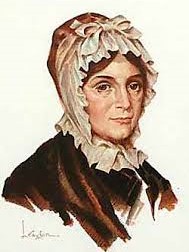 impetuous girl; her father refused permission for them to marry but they simply eloped. William was 22, she was 20. They made peace with her father; he sold them some land; they started a farm. And proceeded to have ten children. All but one of those children lived to adulthood, and one – John Scott Harrison – fathered a president! Which makes William the grandfather of the twenty-third president of the United States. And he also wound up with twenty-five GRANDCHILDREN. Besides farming, fighting, and making babies, he had a few government jobs.
impetuous girl; her father refused permission for them to marry but they simply eloped. William was 22, she was 20. They made peace with her father; he sold them some land; they started a farm. And proceeded to have ten children. All but one of those children lived to adulthood, and one – John Scott Harrison – fathered a president! Which makes William the grandfather of the twenty-third president of the United States. And he also wound up with twenty-five GRANDCHILDREN. Besides farming, fighting, and making babies, he had a few government jobs.
Government Positions
- Secretary of Northwest Territory, 1798
- Territorial Delegate to Congress, 1799-1801
- Territorial Governor of Indiana, 1801-13
- US Congressman from Ohio, 1816-19
- United States Senator, 1825-28
- Minister to Colombia, 1828-29
- Ninth President of the United States, 1841
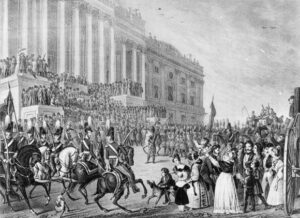 Remember he LOST that 1836 election with only 73 electoral votes to Martin Van Buren’s 170. Is that why he allowed them to use pictures of him sitting by a log cabin for the 1840 campaign? Yes, he won that time, bringing in 234 electoral votes to Van Buren’s 60. And yes, he got to go to Washington and ride a horse to his inauguration on a cold wet day wearing no hat or overcoat (he’d been offered a closed carriage). He read the longest inaugural speech in American history (8,445 words, even after friend Daniel Webster edited it for length) that took two hours to deliver; then back onto that horse in the cold for the parade. Perhaps he wanted to show that he wasn’t a backwoods caricature but a well-educated, well-dressed man. He topped it off by attending three inaugural balls in the evening – one, the Tippecanoe Ball, had a thousand guests. His wife Anna wasn’t there (she probably would have made him put on his coat); she stayed behind in Ohio due to health reasons, planning to travel to Washington in May’s warmer weather.
Remember he LOST that 1836 election with only 73 electoral votes to Martin Van Buren’s 170. Is that why he allowed them to use pictures of him sitting by a log cabin for the 1840 campaign? Yes, he won that time, bringing in 234 electoral votes to Van Buren’s 60. And yes, he got to go to Washington and ride a horse to his inauguration on a cold wet day wearing no hat or overcoat (he’d been offered a closed carriage). He read the longest inaugural speech in American history (8,445 words, even after friend Daniel Webster edited it for length) that took two hours to deliver; then back onto that horse in the cold for the parade. Perhaps he wanted to show that he wasn’t a backwoods caricature but a well-educated, well-dressed man. He topped it off by attending three inaugural balls in the evening – one, the Tippecanoe Ball, had a thousand guests. His wife Anna wasn’t there (she probably would have made him put on his coat); she stayed behind in Ohio due to health reasons, planning to travel to Washington in May’s warmer weather.
That day, March 4, 1841, William Henry Harrison, at the age of 68, became the oldest person to assume the US presidency. By April 4, he was dead. It was first thought it was pneumonia that killed him; later conclusions named typhoid fever as the cause of septic shock. He was bedridden for over a week; doctors tried everything from bloodletting to Virginia snakeroot. Large crowds gathered outside the White House, holding vigil while awaiting news.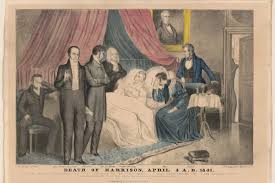
A mourning period lasted as long as his presidency; there were public ceremonies and an invitation-only funeral service; his coffin was brought to Congressional Cemetery in Washington and placed in a public vault. The procession was described like this:
The roar of cannon and the tolling of bells filled the air, while many houses were shrouded with crape, and the streets were black with people. As the day advanced, the procession made its appearance, coming slowly through the Avenue, carriage after carriage, in long succession, while thousands upon thousands followed on foot—all moving to the sound of melancholy music.
In June, William’s body was transported by train and river barge to North Bend, Ohio, and he was buried on July 7 in a family tomb at the summit of Mt. Nebo overlooking the Ohio River. He died nearly penniless. Congress voted his wife Anna a presidential widow’s pension of $25,000 (one year of William’s salary) and the right to mail letters free of charge. She lived another twenty-seven years.
William Henry Harrison’s long-term impact on American politics includes his campaigning methods, which laid the foundation for modern presidential campaign tactics.
Wirt wirt.
» posted on Saturday, June 22nd, 2024 by Linda Lou Burton
#8. Van Buren, Martin
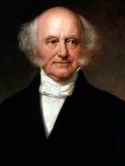 Linda Lou Burton posting from Little Rock, Arkansas – Martin Van Buren (December 5, 1782 – July 24, 1862) was the eighth president of the United States (1837-1841). It may be disheartening to be remembered as one of the “most forgettable” presidents, but that’s where historians tend to rank him. When they remember. There are a few unique things about Martin you may want to remember though. He was the first president born in the United States, and the first president for which English was a second language. Yes, that actually does make sense; the first seven presidents were born on soil that later BECAME the United States and they fought tooth and toenail to make it happen. By the time Martin was born in Kinderhook, New York, a little town on the Hudson River just south of Albany, things had calmed down. His father Abraham was a Patriot during the American Revolution; he owned an inn and tavern in Kinderhook and also was town clerk. Martin’s mother Maria already had three children when she married Abraham; together they had five; Martin was third. And Martin’s family spoke DUTCH. “Maarten” didn’t learn English until he started to school. He got a basic education at the village schoolhouse, briefly studied Latin at Kinderhook Academy, and went on to Washington Seminary at Claverack. But with a father as a tavern keeper, perhaps Martin’s most valuable experience growing up was being able to interact with many different types of people. Yes, you’d want him to come to your party, and sure, he’d be there, mingling and talking with everyone.
Linda Lou Burton posting from Little Rock, Arkansas – Martin Van Buren (December 5, 1782 – July 24, 1862) was the eighth president of the United States (1837-1841). It may be disheartening to be remembered as one of the “most forgettable” presidents, but that’s where historians tend to rank him. When they remember. There are a few unique things about Martin you may want to remember though. He was the first president born in the United States, and the first president for which English was a second language. Yes, that actually does make sense; the first seven presidents were born on soil that later BECAME the United States and they fought tooth and toenail to make it happen. By the time Martin was born in Kinderhook, New York, a little town on the Hudson River just south of Albany, things had calmed down. His father Abraham was a Patriot during the American Revolution; he owned an inn and tavern in Kinderhook and also was town clerk. Martin’s mother Maria already had three children when she married Abraham; together they had five; Martin was third. And Martin’s family spoke DUTCH. “Maarten” didn’t learn English until he started to school. He got a basic education at the village schoolhouse, briefly studied Latin at Kinderhook Academy, and went on to Washington Seminary at Claverack. But with a father as a tavern keeper, perhaps Martin’s most valuable experience growing up was being able to interact with many different types of people. Yes, you’d want him to come to your party, and sure, he’d be there, mingling and talking with everyone.
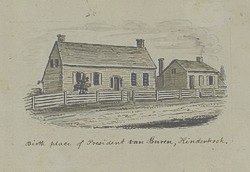 Martin’s nickname was “Little Van;” he was 5’6” and slight. At the age of 14 he began reading law at the office of Peter Silvester. Life in Martin’s family was pretty “down to earth” and casual; his clothing was homespun and rough. The Silvesters chided him about that; not an appearance suitable for an aspiring lawyer! Martin listened to what they said; he began to dress, and behave, in a more, “upscale” manner. Except he stayed true to his father’s Democratic-Republican leanings. How did that work out for Martin?
Martin’s nickname was “Little Van;” he was 5’6” and slight. At the age of 14 he began reading law at the office of Peter Silvester. Life in Martin’s family was pretty “down to earth” and casual; his clothing was homespun and rough. The Silvesters chided him about that; not an appearance suitable for an aspiring lawyer! Martin listened to what they said; he began to dress, and behave, in a more, “upscale” manner. Except he stayed true to his father’s Democratic-Republican leanings. How did that work out for Martin?
New York New York
The Silvesters decided he should complete his education with a Democratic-Republican attorney; so off he went (spiffy clothes and all) to New York City, and an apprenticeship with William Van Ness, a political lieutenant of Aaron Burr. And that got him into the intricacies of politics. He was admitted to the New York bar in 1803, at the age of 21. In his lifetime, he was elected or appointed to eight different jobs in government.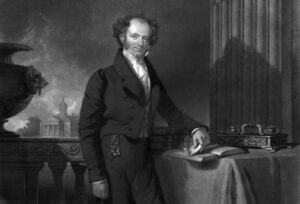
Government Positions
- New York State Senator, 1813-15
- New York Attorney-General, 1815-19
- United States Senator, 1821-29
- Governor of New York, 1829
- Secretary of State, 1829-1831 (under Jackson)
- Minister to England, 1831
- Vice President, 1833-1837 (under Jackson)
- 8th President of the United States, 1837-1841
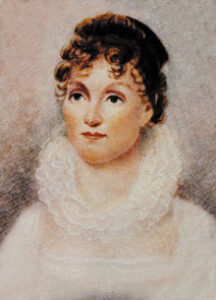 Martin got married and had children too. In 1807 he and his childhood sweetheart Hannah Hoes (1783-1819) married; together they had five sons; four lived to adulthood. Hannah was Dutch too (in that part of New York state it was almost a given); she spoke English, but with a marked accent. Sadly, only twelve years into their marriage, she died of tuberculosis at the age of 36; the children were 12, 9, 7 and 2. Martin was 37; he never remarried, another in the list of “widowers in the White House.”
Martin got married and had children too. In 1807 he and his childhood sweetheart Hannah Hoes (1783-1819) married; together they had five sons; four lived to adulthood. Hannah was Dutch too (in that part of New York state it was almost a given); she spoke English, but with a marked accent. Sadly, only twelve years into their marriage, she died of tuberculosis at the age of 36; the children were 12, 9, 7 and 2. Martin was 37; he never remarried, another in the list of “widowers in the White House.”
When he first arrived he tried managing the social events there, but enlisted the help of his daughter-in-law Angelica Singleton Van Buren in 1838. Angelica got advice from Dolley Madison (they were distant relatives) and things began to liven up; she was praised as a “lady of rare accomplishments.” But overall, it backfired. Angelica began to lean towards a formal style; you can guess how it went from 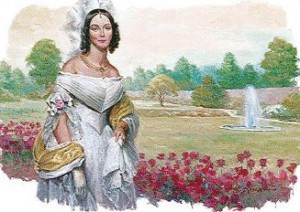 there. Her plan to re-landscape the White House grounds to resemble the royal gardens of Europe set the press on fire, and opponents attacking. Pennsylvania Whig Congressman Charles Ogle referred to her as part of the presidential “household” in his famous Gold Spoon Oration, an attack delivered in Congress depicting Martin as living a royal lifestyle. Not something that would lead to the re-election of the man who followed eight years of the “Andrew Jackson” style, especially during the deep depression that was going on in the country at the time.
there. Her plan to re-landscape the White House grounds to resemble the royal gardens of Europe set the press on fire, and opponents attacking. Pennsylvania Whig Congressman Charles Ogle referred to her as part of the presidential “household” in his famous Gold Spoon Oration, an attack delivered in Congress depicting Martin as living a royal lifestyle. Not something that would lead to the re-election of the man who followed eight years of the “Andrew Jackson” style, especially during the deep depression that was going on in the country at the time.
I wondered about the connection between Andrew and Martin – two vastly different personalities and styles; a Mutt and Jeff pairing. But Andrew chose him as Secretary of State; he was Andrew’s vice president; and Andrew supported his candidacy in 1836. The list of scandals and deal-makings during Martin’s presidency is too long and boring to recite here; some of it worked but most went sour. Yes, it was Andrew Jackson’s Indian Removal Act of 1830; but it was during Martin Van Buren’s term that 19 treaties were negotiated with Indian tribes. In 1838, it was Martin Van Buren who directed General Winfield Scott to forcibly remove all who had not complied. The Trail of Tears; 20,000 Cherokee relocated against their will. The Seminoles in Florida; the Second Seminole War, the refusal to admit Texas as a slave state – Martin earned another nickname: Martin Van Ruin.
Ah, politics. From the Virginia Dynasty to the Common Man to the Albany Regency. Do the presidential choices made reflect more on those running for office, or those voting?
Martin Van Buren ran for president, or tried to, four times, and lost three. Here are the numbers:
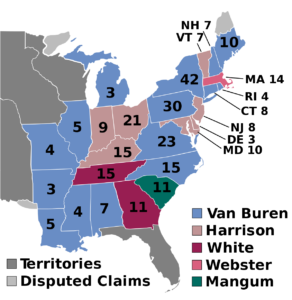 1836: Martin Van Buren 170. William Henry Harrison 73.
1836: Martin Van Buren 170. William Henry Harrison 73.
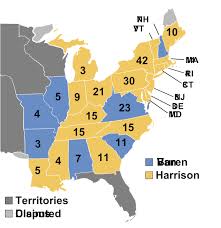 1840: William Henry Harrison 234. Martin Van Buren 60.
1840: William Henry Harrison 234. Martin Van Buren 60.
He received no electoral votes in 1844 or 1848.
He never sought public office again after the 1848 election, but he continued to follow national politics. His health began to fail in 1861, and he died of bronchial asthma and heart failure at home on July 24, 1862, age 79.He is buried in the Kinderhook Reformed Dutch Church Cemetery, as are his wife Hannah, his parents, and his son Martin Van Buren Jr. Martin Van Buren outlived all four of his immediate successors: Harrison, Tyler, Polk, and Taylor.
Here’s a bit of trivia that might be fun to remember about Martin Van Buren: Kinderhook, New York was sometimes referred to as “Old Kinderhook” in speeches, and print, so during his campaign, O K Clubs formed to support him. O K later came to mean “all right.”
O K, Martin. Maybe you should have ignored the Silvesters when they advised you to become a fancy-pants. It seems you understood people well, thanks to your father, and that tavern.
» posted on Friday, June 21st, 2024 by Linda Lou Burton
#7. Jackson, Andrew
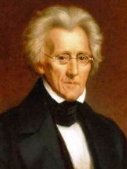 Linda Lou Burton posting from Little Rock, Arkansas – Andrew Jackson (March 15, 1767 – June 8, 1845) was the seventh president of the United States (1829 to 1837), and a man of many contradictions. The first person to write his biography after his death, James Parton, summed it like this: “Andrew Jackson…was a patriot and a traitor. He was one of the greatest generals, and wholly ignorant of the art of war. A brilliant writer, elegant, eloquent, without being able to compose a correct sentence or spell words of four syllables. The first of statesmen, he never devised, he never framed, a measure. He was the most candid of men, and was capable of the most profound dissimulation. A most law-defying law-obeying citizen. A stickler for discipline, he never hesitated to disobey his superior. A democratic autocrat. An urbane savage. An atrocious saint.” Would you want this man at your party? I would; I’d like to hear what he thinks of the Electoral College system today. Some outcomes have even been worse than what happened to him back in 1824. But it might be a tricky evening – he shot a lot of people, and, he got shot, and shot AT, many times in his 78 years. When he died, he still had bullets rattling around in his chest. He had scars on his face and in his heart; and he had grudges going way, way back. But there are also stories of great passion, and tenderness.
Linda Lou Burton posting from Little Rock, Arkansas – Andrew Jackson (March 15, 1767 – June 8, 1845) was the seventh president of the United States (1829 to 1837), and a man of many contradictions. The first person to write his biography after his death, James Parton, summed it like this: “Andrew Jackson…was a patriot and a traitor. He was one of the greatest generals, and wholly ignorant of the art of war. A brilliant writer, elegant, eloquent, without being able to compose a correct sentence or spell words of four syllables. The first of statesmen, he never devised, he never framed, a measure. He was the most candid of men, and was capable of the most profound dissimulation. A most law-defying law-obeying citizen. A stickler for discipline, he never hesitated to disobey his superior. A democratic autocrat. An urbane savage. An atrocious saint.” Would you want this man at your party? I would; I’d like to hear what he thinks of the Electoral College system today. Some outcomes have even been worse than what happened to him back in 1824. But it might be a tricky evening – he shot a lot of people, and, he got shot, and shot AT, many times in his 78 years. When he died, he still had bullets rattling around in his chest. He had scars on his face and in his heart; and he had grudges going way, way back. But there are also stories of great passion, and tenderness.
What happened to Andrew in his early life? It pretty much sucked; a Charles Dickenson-Oliver Twist tear-jerker if you ask me. This red-headed blue-eyed Irishman was in defense mode from his first breath, just trying to survive.
Stage One
Andrew Jackson and Elizabeth Hutchinson immigrated from Ireland in 1765; they landed in Philadelphia and headed south through the Appalachian Mountains to a Scots-Irish community on the border between North and South Carolina. They brought two children with them, Hugh was two, Robert was a year old. Three weeks before Andrew was born in March of 1767, his father was killed in a logging accident. Elizabeth and her three little boys lived with relatives in the community for a while; the boys had some schooling from a nearby priest. Contradictions began early on – Andrew was a bully, but he also took weaker kids under his wing in kindness. Andrew was nine when the Revolutionary War began; his brother Hugh was 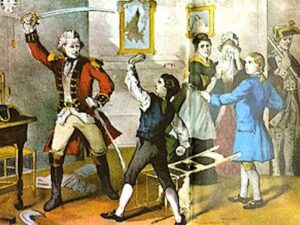 killed in battle in 1779. Elizabeth encouraged Robert and Andrew to attend local militia drills; they soon became couriers; but were captured by the British in April 1781 (Andrew was 14). They were not good POW’s – Andrew refused to clean an officer’s boots; the officer’s sword quickly slashed his face and hand; it left Andrew with scars and an intense hatred for the British. The story doesn’t get prettier; both boys contracted smallpox and almost starved in captivity. Elizabeth somehow managed to secure their release; the three began walking the 40 miles back home when a torrential downpour began. Two days after returning home, Robert was dead and Andrew terribly ill. After nursing Andrew back to health, Elizabeth volunteered to nurse American prisoners of war on board two British ships in the Charleston harbor, where there had been an outbreak of cholera. She died from the disease in November and is buried in an unmarked grave. By the end of 1781, Andrew was an orphan. Summary of his 14th year – he suffered captivity by the British, near starvation, the disease of smallpox, and the loss of two brothers and his mother. The scars from his smallpox and that British sword stayed with him forever. So did his hatred of the British. How would you feel after such a year? And what did Andrew do next?
killed in battle in 1779. Elizabeth encouraged Robert and Andrew to attend local militia drills; they soon became couriers; but were captured by the British in April 1781 (Andrew was 14). They were not good POW’s – Andrew refused to clean an officer’s boots; the officer’s sword quickly slashed his face and hand; it left Andrew with scars and an intense hatred for the British. The story doesn’t get prettier; both boys contracted smallpox and almost starved in captivity. Elizabeth somehow managed to secure their release; the three began walking the 40 miles back home when a torrential downpour began. Two days after returning home, Robert was dead and Andrew terribly ill. After nursing Andrew back to health, Elizabeth volunteered to nurse American prisoners of war on board two British ships in the Charleston harbor, where there had been an outbreak of cholera. She died from the disease in November and is buried in an unmarked grave. By the end of 1781, Andrew was an orphan. Summary of his 14th year – he suffered captivity by the British, near starvation, the disease of smallpox, and the loss of two brothers and his mother. The scars from his smallpox and that British sword stayed with him forever. So did his hatred of the British. How would you feel after such a year? And what did Andrew do next?
On To Rachel, and Orphans
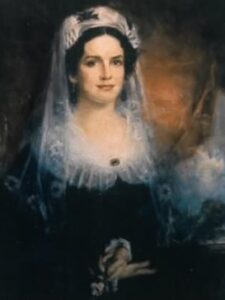 Andrew made do. He boarded with various people, went to a local school, tried saddle making, and studied with enough lawyers to be admitted to the bar in North Carolina in 1787, at the age of 20. Then Andrew headed west; he got a job as a prosecutor in western North Carolina; he bought his first slave, fought his first duel, and moved on to Nashville, a small frontier town, in 1788. That’s where he met Rachel. Rachel Donelson Robards (1767-1828) was married at the time; an unhappy marriage. The story goes that she divorced Captain Robards, and married Andrew in 1791 – they were both 24. It seems Rachel’s divorce wasn’t final however and she and Andrew were in a bigamous relationship; they did a redo and married for the second time in 1794. Evidence shows that Rachel was living with Andrew before the petition for divorce was ever made; a fact that was raked over the coals during Andrew’s presidential campaign. His love for Rachel is a “once is enough” romance, with many happy days but a tragic end. Rachel often struggled while Andrew was away, but she began experiencing significant physical stress during the election season. She died of a heart attack on December 22, 1828, 10 weeks before her husband took office as president. Andrew literally had to be pulled from her side so the undertaker could prepare the body. Believing that the abuse from John Quincy Adams’ supporters hastened her death, Andrew swore at her funeral, “May God Almighty forgive her murderers. I never can.”
Andrew made do. He boarded with various people, went to a local school, tried saddle making, and studied with enough lawyers to be admitted to the bar in North Carolina in 1787, at the age of 20. Then Andrew headed west; he got a job as a prosecutor in western North Carolina; he bought his first slave, fought his first duel, and moved on to Nashville, a small frontier town, in 1788. That’s where he met Rachel. Rachel Donelson Robards (1767-1828) was married at the time; an unhappy marriage. The story goes that she divorced Captain Robards, and married Andrew in 1791 – they were both 24. It seems Rachel’s divorce wasn’t final however and she and Andrew were in a bigamous relationship; they did a redo and married for the second time in 1794. Evidence shows that Rachel was living with Andrew before the petition for divorce was ever made; a fact that was raked over the coals during Andrew’s presidential campaign. His love for Rachel is a “once is enough” romance, with many happy days but a tragic end. Rachel often struggled while Andrew was away, but she began experiencing significant physical stress during the election season. She died of a heart attack on December 22, 1828, 10 weeks before her husband took office as president. Andrew literally had to be pulled from her side so the undertaker could prepare the body. Believing that the abuse from John Quincy Adams’ supporters hastened her death, Andrew swore at her funeral, “May God Almighty forgive her murderers. I never can.”
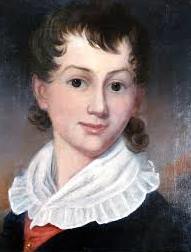 Andrew and Rachel never had children together but adopted, or cared for “a lot of kids” in their Nashville home, The Hermitage. In 1808, they took in one of the infant twins of Rachel’s brother Severn Donelson, and raised him as their own. They named him Andrew
Andrew and Rachel never had children together but adopted, or cared for “a lot of kids” in their Nashville home, The Hermitage. In 1808, they took in one of the infant twins of Rachel’s brother Severn Donelson, and raised him as their own. They named him Andrew 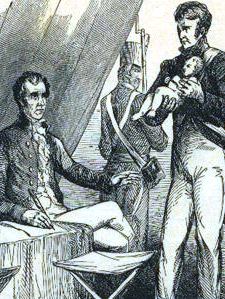 Jackson Jr. (1808-1865). When Rachel’s brother Samuel Donelson died in 1804 they cared for his three sons — John Samuel, Andrew Jackson, and Daniel. When Andrew found a Native American child on the battlefield with his dead mother in 1813, he brought him to the Hermitage, named him Lyncoya, and raised and educated him along with Andrew Jr. Andrew Jackson Hutchings, grandson of Rachel’s sister, lost both parents when he was five; he too was brought to the Hermitage and attended school with Andrew Jr and Lyncoya. Quite a legacy for one who was orphaned at an early age himself.
Jackson Jr. (1808-1865). When Rachel’s brother Samuel Donelson died in 1804 they cared for his three sons — John Samuel, Andrew Jackson, and Daniel. When Andrew found a Native American child on the battlefield with his dead mother in 1813, he brought him to the Hermitage, named him Lyncoya, and raised and educated him along with Andrew Jr. Andrew Jackson Hutchings, grandson of Rachel’s sister, lost both parents when he was five; he too was brought to the Hermitage and attended school with Andrew Jr and Lyncoya. Quite a legacy for one who was orphaned at an early age himself.
The Battles
This tender man who cared for so many children in need also fought in four different wars – the Revolutionary War, the Creek War, the War of 1812, and the First Seminole War. I’ll let you look those up yourself to read about his fierceness, campaign strategies, and tough leadership skills; there is much written about him as “War Hero.” He, like George Washington and James Monroe, got back up and kept fighting, no matter how many times he was down. He earned the nickname “Old Hickory” because he was a strict and bold military officer, unbending as a tree, and tough as wood.
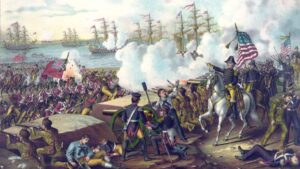 He ran for president in 1824, winning the most popular and electoral votes. But that was a battle he LOST. Since no candidate won an electoral majority, the House of Representatives elected John Quincy Adams in a contingent election. In the years ahead, Andrew Jackson repeatedly called for the abolition of the Electoral College, recommending “giving the election of President and Vice-President to the people.”
He ran for president in 1824, winning the most popular and electoral votes. But that was a battle he LOST. Since no candidate won an electoral majority, the House of Representatives elected John Quincy Adams in a contingent election. In the years ahead, Andrew Jackson repeatedly called for the abolition of the Electoral College, recommending “giving the election of President and Vice-President to the people.”
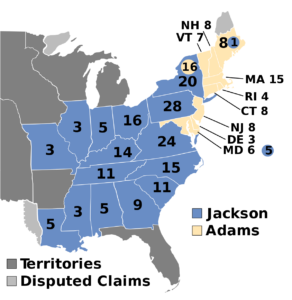 The Tennessee legislature didn’t waste any time in nominating Andrew for president again – they did it more than three years before the 1828 election, the earliest nomination in presidential history. The campaign was personal, and mean; the candidates didn’t campaign but the press stayed on it, calling Andrew Jackson a slave trader and a cannibal (eating the bodies of Indians killed in battle); they called his mother a prostitute and his father a mulatto; and of course, there was that “bigamy” issue about Rachel. Karma again did what Karma does – Andrew Jackson received 178 electoral votes to John Quincy Adams’ 83. And for the second time, an outgoing president did not attend the new president’s inauguration.
The Tennessee legislature didn’t waste any time in nominating Andrew for president again – they did it more than three years before the 1828 election, the earliest nomination in presidential history. The campaign was personal, and mean; the candidates didn’t campaign but the press stayed on it, calling Andrew Jackson a slave trader and a cannibal (eating the bodies of Indians killed in battle); they called his mother a prostitute and his father a mulatto; and of course, there was that “bigamy” issue about Rachel. Karma again did what Karma does – Andrew Jackson received 178 electoral votes to John Quincy Adams’ 83. And for the second time, an outgoing president did not attend the new president’s inauguration.
Neither did Andrew’s wife of course. On March 4, 1829, ten weeks after her Christmas Eve 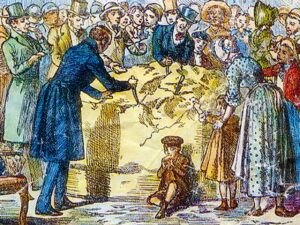 funeral at the Hermitage, Andrew Jackson became the first president-elect to take the oath of office on the East Portico of the US Capitol. At the end of the ceremony, he invited the public to the White House for a party. This “common man of the people” spent his first day as president surrounded by thousands of people living it up in the White House; the staff was overwhelmed and fixtures and furnishings were damaged.
funeral at the Hermitage, Andrew Jackson became the first president-elect to take the oath of office on the East Portico of the US Capitol. At the end of the ceremony, he invited the public to the White House for a party. This “common man of the people” spent his first day as president surrounded by thousands of people living it up in the White House; the staff was overwhelmed and fixtures and furnishings were damaged.
The second inauguration of Andrew Jackson took place in the House Chamber of the US Capitol on March 4, 1833. It was held inside because the temperature was 29 degrees, there was snow on the ground, and Andrew’s health was poor. His private secretary, Andrew 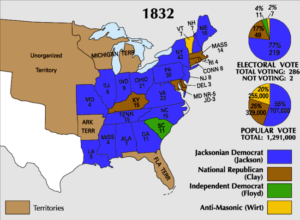 Jackson Donelson, stood on his right during the swearing in. Remember him? One of Rachel’s nephews that he raised. Martin Van Buren, the new vice president, stood to the left. No mob parties at the White House this time; but two inaugural balls. That evening there were 50-gun salutes at 9 PM and at midnight. Andrew won this time with 219 electoral votes to Clay’s 49. The country had grown to 24 states, and at that moment in time, was not in conflict with any nation.
Jackson Donelson, stood on his right during the swearing in. Remember him? One of Rachel’s nephews that he raised. Martin Van Buren, the new vice president, stood to the left. No mob parties at the White House this time; but two inaugural balls. That evening there were 50-gun salutes at 9 PM and at midnight. Andrew won this time with 219 electoral votes to Clay’s 49. The country had grown to 24 states, and at that moment in time, was not in conflict with any nation.
Andrew retired to the Hermitage in 1837, and though in poor health, he remained influential in national and state politics. On June 8, 1845, surrounded by family and friends, he died of heart failure at the age of 78. Historian Charles Grier Sellers wrote about him: “There has never been universal agreement on Jackson’s legacy, for his opponents have ever been his most bitter enemies, and his friends almost his worshippers.”
His Government Positions
- Member of U.S. House of Representatives, 1796-97
- United States Senator, 1797-98
- Justice on Tennessee Supreme Court, 1798-1804
- Governor of the Florida Territory, 1821
- United States Senator, 1823-25
- Seventh President of the United States, 1829-1837
My maternal grandfather, born in the late 1800s, was named after Andrew Jackson. My grandfather also was orphaned at an early age – his mother died when he was four; his father when he was fourteen. I find him on the US Census at age 16, boarding with one of his brothers at the home of a man who owned a sawmill.
Isn’t that ironic?

